ENHANCING EMPLOYABILITY FOR TAUGHT POSTGRADUATES
Navigating careers support for international postgraduates
Underrepresentation in postgraduate study: What can we do?


Bringing employers and PGTs together for alternative assessment types



Navigating careers support for international postgraduates
Underrepresentation in postgraduate study: What can we do?


Bringing employers and PGTs together for alternative assessment types


AGCAS training gives you the opportunity to learn, hone and augment your knowledge and skills, while extending your professional network.
For the entrant, with 0–2 years ’ experience, we have our
Employability Advice as well as our Introductions series, which covers:
Advice
Guidance Interviewing
Employer Engagement
andData.
For the established, with 2–5 years ’ experience, expand your knowledge, confidence and toolkit with courses including:
Work-Related Learning in HE
Recruitment Practices and Talent Management: Bridging the Gap Group Work


Career Coaching (Information, Advice and Guidance)
Employability and Career Development Learning. and
And for the experienced, with 5 years and more, consider:
Guidance Refresher
Leadership Refresher
Management of HE Careers and Employability Services
Guidance Skills (Advanced). and
We also have cross-cutting courses which are relevant to anyone, however long you have been in your role Join:
Writing for Impact
Technology-Based Career Learning and Provision
Challenges of Careers Work in HE and and keep an eye out forWorkshops
With prices for Full Members starting at £40, you’ll find training wherever you are on your Professional Pathway, wherever you want to go.
For details of these training courses, free of charge webinars, online forums, conferences and more, view AGCAS Training and Conferences or get in touch with learning@agcas org uk

ENHANCING EMPLOYABILITY OUTCOMES: THE WARWICK AWARD FOR POSTGRADUATE TAUGHT
THE AGCAS POSTGRADUATE TAUGHT TASK GROUP – 2023 AND BEYOND
ACCELERATING EMPLOYABILITY: PROJECTS, PLACEMENTS AND EMBEDDED
INCREASED INTERNATIONAL STUDENT NUMBERS: A CAUSE FOR CELEBRATION
SUPPORTING POSTGRADUATES THROUGH
42 THE SOLICITORS’ QUALIFYING EXAM AND QUALIFYING WORK EXPERIENCE: DISPELLING COMMON MISCONCEPTIONS
46 WHAT DOES ECONOMIC UNCERTAINTY MEAN FOR 2023 GRADUATES?

In this issue of Phoenix, we profile how university careers services are supporting postgraduate taught (PGT) students with their career aspirations against a changing higher education landscape The UK postgraduate taught student population has significantly increased in recent years, due in part to graduate uncertainty about joining the labour market during the pandemic. Through this issue, we explore how the expansion in postgraduate taught student numbers is affecting how services are delivering tailored employability guidance
Emma Hill
Edinburgh Napier University
The following articles demonstrate the adaptations made by services to meet the needs of far larger cohorts, including expanding the range and type of online support resources available With more students, and increased demands on their time, online skills development programmes that can be tailored to individual student needs and schedules have proved crucial to enhancing postgraduate employability. Read about several innovative programmes across the sector in this issue Collaboration across the university to gain intelligence and provide wider-ranging support is also a key theme in this issue
Sarah Brown
University of Gloucestershire
Holly Delafield
University of Bristol
Kaz Scattergood
University of Liverpool
A significant percentage of the postgraduate population growth comprises international students outside of the EU In this issue, we share how member services have adapted their work to meet student needs, including working far more closely with international student recruitment teams to deliver information and support at the application stage Careers services are acutely aware of the difficulties inherent in delivering comprehensive employability support to international postgraduate students on a one-year course Services are taking innovative approaches to address this, delivering online employability courses to students before their academic programmes begin and delivering a wide range of embedded employability awards. In this issue, read how careers teams are working with employers to provide suitable work experience opportunities for international students, and to champion the benefits of hiring international student and graduate talent
Sophie Hall
Cardiff University
Lisa McWilliams
Keele University
Listening to international students and graduates and hearing their stories is essential to delivering comprehensive employability support Florence Reedy, AGCAS Policy and Research Manager, provides an overview of recent research from AGCAS and the International Task Group into international graduates and UK employment. This analyses the success of the Graduate route, provides real examples of international graduates seeking and gaining employment in the UK, and makes a series of recommendations to policy makers, employers, universities and careers and employability services
Placement and work experience support is another theme that comes through strongly in this issue. Read how member services are working with employers to provide bespoke project-based work experience activity to enhance the student experience of taught postgraduates In some cases, this offers an alternative to a traditional postgraduate dissertation, with rigorous academic and research components to the project
Member services also share strategies they have put in place to support underrepresented students to access and successfully transition to postgraduate study Increasing students’ awareness of the range of degrees on offer and the funding and support options available is key to ensuring a more representative cohort of postgraduate talent
The AGCAS Postgraduate Taught Task Group is seeking even more examples of innovative work to support PGTs. If you have been inspired by the articles in this issue, consider supplying a case study, or join the conversation by attending their upcoming discussion forum
We also have a guest article from the Clinical Legal Education Organisation, addressing misconceptions about the Solicitors Qualifying Examination (SQE) and Qualifying Work Experience (QWE). Toolkits for careers advisers and students on QWE are available to provide further information.

I hope you get a lot from the issue Thank you to everyone who has contributed
Lucy Begley, EditorSUZANNE AGNEW and DR KAY BARBOUR, Careers Consultants at the University of Edinburgh, outline their journey to deliver support to a diverse cohort of taught postgraduate students who are presenting with increasingly international and professional backgrounds Before starting their studies, incoming masters students engage with an asynchronous 6-week transition course, which leads into the synchronous Masters Careers programme launching in Welcome Week and delivered through semesters one and two.

At the University of Edinburgh, we believe early career planning leads to future career success. A four-year undergraduate degree gives students time to engage with our Careers Compass, a career planning model helping students navigate their future routes This is more challenging for the one-year, full-time masters student, often juggling a new university with advanced academic study International students are further tested by needing to adapt to a different system, academically, culturally and socially
Edinburgh has over 9,500 taught postgraduate student entrants More than 60% are international, studying anything from Playwriting to Surgical Sciences Many hope to secure UK graduate roles with large international companies after graduation, via the Graduate visa or through sponsorship These employers expect applications of note at an early point in the masters students’ academic year, when they have just arrived and are still acclimatising Other postgraduate taught students are career changers or established career professionals hoping to use their masters to navigate senior roles Feedback from invested academic partners reinforced the value of relevant employability support for these groups
We were challenged to develop a career planning programme following the Compass model that was:

Broad enough to address different disciplines, modes and schools but specific enough to be meaningful for individual experiences
Responsive to the range of experience brought - from none to experienced professional Capable of reaching large numbers, as the cohort continues to increase annually
Focused on a call to action without adding to anxieties.
In focus groups, students told us they wanted time to engage and prepare for postgraduate level study before they began their course. There was nervousness around stepping up to postgraduate study as well as anxiety for professionals returning to study With collaboration from academics, and partnering with our Institute for Academic Development, we initiated a six-week asynchronous course allowing students to engage with each other to explore the core academic skills needed for successful postgraduate study and to review their progress towards their career goals Students keep a reflective blog of their experiences, aims and expectations through discussion boards, online collaboration tools and blogs They access the course before their postgraduate degree commences, and after six weeks it remains a static resource forming the launchpad into Masters Careers in Welcome Week This orientates students new to Edinburgh and introduces them to a supportive community before moving onto challenging postgraduate study
We focus on helping international students understand the UK graduate market, training schemes and selection methods
Masters Careers began as a series of one-hour, online presentations, delivered across two semesters, encompassing topics of career planning, the graduate job market, and further study Delivered live, we recorded for later catch-up Some sessions were differentiated by ‘developing’ (for those with less than three years ’ professional experience) and ‘advancing’ (more than three years ’ professional experience) to reflect the varying levels of experience of postgraduate students The programme ran early evening to ensure inclusivity and wider access for those working, or with additional caring responsibilities, as well as catering for different time zones
Through 2019/20, we piloted the programme with the College of Arts, Humanities and Social Sciences Subsequently, we extended the programme to include all three Colleges During 2020/21 and 2021/22, we delivered 15 sessions across the year with a dizzying combination of Colleges and levels Attendance and feedback were good, but we were conscious that students sometimes engaged with an inappropriate session for their level and subject or were unaware in which College their programme was housed Our carefully nuanced distinctions were not always understood It was time to pause, reflect and change course
For 2022/23, we simplified and clarified our offer We offer six sessions per semester, each including a five-minute call to action video Each session comprises short formal input, with lots of time for questions Our first session in week 0, before classes commence, allows students to begin early planning for the graduate recruitment market For September 2022, it attracted over 600 attendees, an increase of 56% on the previous year
The first semester focuses on the masters student, possibly straight from an undergraduate programme, keen to use their degree to augment their presentation to graduate recruiters We focus on helping international students understand the UK graduate market, training schemes and selection methods We also encourage early engagement with LinkedIn and an understanding of the marketplace, the UK landscape and PhD study Our final session for the first semester partners with our Student Immigration Service to address any areas of concern for the students The second semester focuses on the international student who comes to the university with previous experience We include sessions focussed on career changers as well as considering those applying for senior positions using their masters as a launchpad
To date, numbers have been strong For semester one in 2022/23, the live Masters Careers sessions secured 1,400 attendees from 2,977 registrations, already surpassing last year ’ s total figures for the programme Comments from students include ‘I like the structure and flow’ ‘kind hosts with an honest desire to help us ’ and ‘ very informative and properly conducted’ Learning points include ‘the importance of planning ahead’ ‘the need to develop strategies’ and ‘the value of engaging and networking’ Partnering with professional services and securing academic buy-in shows alignment with the university’s purpose and evidences the value of timely careers and employability support Plans are in place to run a series of structured conversations with 2022/23 attendees to understand the impact of the Masters Careers programme on graduating students’ employability, career thinking and career destinations
The Masters Careers experience has helped us better understand our taught postgraduate students We have a huge sense of satisfaction in providing flexible and timely support to our students, empowering them to navigate their future career journeys
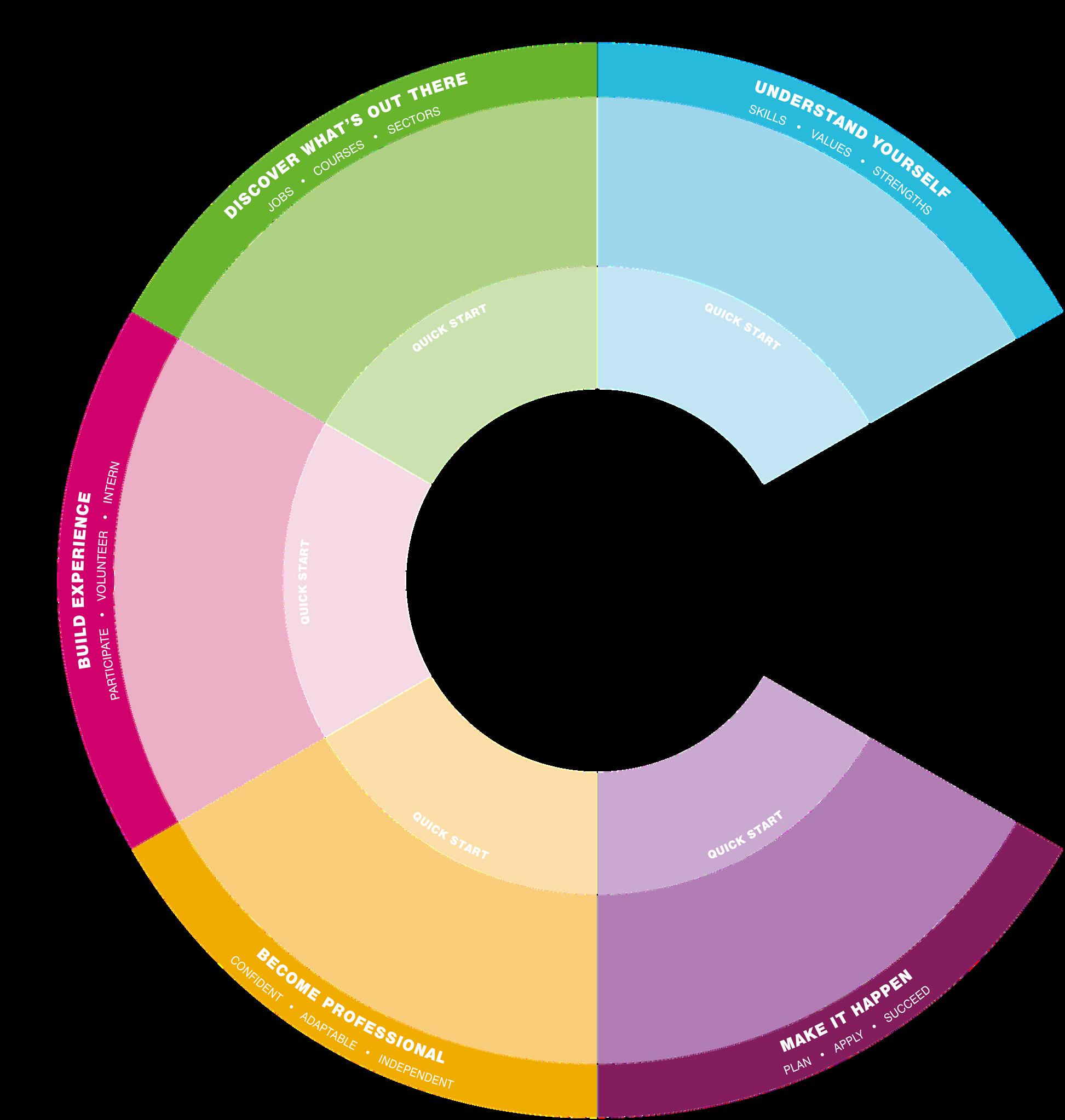


AMY LONGSDEN, Careers Consultant, LIV POWELL, Plus Programme Officer and IQRA
ARSHAD, Employability and Progression Assistant from the University of Leeds describe some of the measures put in place to encourage underrepresented students to embark on taught postgraduate study at their institution The Plus Programme offers a package of financial, social and careers activity to enable students’ transition, success and progression
The Plus Programme administers the Leeds Masters Scholarship, which aims to encourage eligible UK fee-paying students from underrepresented backgrounds to study a masters qualification This scholarship is currently worth £7,000, having recently been increased from £5,000 based on extensive research into the impact of rising tuition fees and cost of living on masters students The scholarship can be awarded as either a partial fee waiver or monthly maintenance payments
The Leeds Masters Scholarship has an extremely positive impact on its recipients’ student experience, allowing students the financial means to focus on their studies, to purchase essential course materials and to socialise more easily with other students
“The Leeds Masters Scholarship has been helpful as it means I can pay rent... I couldn’t do my masters without it and I couldn’t be in Leeds. I would have had to move in with a family member hundreds of miles away from here, and not be able to study.”
The University of Leeds Plus Programme has been working with undergraduate students from underrepresented backgrounds since 2014 and in 2019 was expanded to include postgraduate taught students In 2021/22, 360 masters students were eligible for the programme (alongside almost 6000 at undergraduate level), which aids their transition to postgraduate study, academic attainment and sense of belonging, as well as successful progression to employment or further study

There are numerous eligibility criteria for the Plus Programme, including being from an area of lower participation in higher education, being care-experienced or estranged, or a carer Students can self-select into the programme, and all those who receive a Leeds Masters Scholarship are automatically included
This article shares some of the ways we are addressing the needs of underrepresented students transitioning to – and progressing from – postgraduate education
The Plus Programme plans and delivers several ‘Postgraduate Taught Study Information Sessions’ each academic year, focused on informing undergraduate students from underrepresented backgrounds These students have either never considered studying a masters degree before or have considered the possibility but remain unsure whether it is for them This can be due to a lack of knowledge of how a masters degree works, concerns regarding the jump in academic demand from undergraduate to postgraduate study, and a feeling that masters study is “not for” students from underrepresented backgrounds
These sessions provide students with more information on masters degrees to increase their confidence in committing to and applying for further study, through the delivery of presentations by academic staff, professional services staff, and current masters students from underrepresented backgrounds These presentations increase students’ awareness of the diversity of degrees on offer, the funding options available to them, and the experiences of masters students from similar backgrounds to them, in line with the principle of “If you can see it, you can be it”

A major focus of the Plus Programme is the ‘on-boarding’ period in the summer prior to induction, ensuring students feel comfortable with what to expect once at university. Postgraduate students are given advance access to Minerva, our virtual learning environment, which houses ‘Prepare for Postgrad’ resources. These resources encourage students to think ahead of time about their priorities for the first few weeks of their course, budgeting and finance, study skills, and (from summer 2022) a section on careers. This section aims to raise awareness of the careers service and draw attention to events like careers fairs taking place in October, which can otherwise be easily missed by busy masters students in the flurry of start-of-semester activities.
The Leeds Postgraduate Next Steps Mentoring Scheme is exclusive to postgraduate taught students on the Plus Programme. Mentees on this scheme meet with their mentors online or in person to ask for advice, guidance and practical information on how they can market their masters degree, and to make connections
Previously the scheme matched mentees with either an academic or an industry professional in a sector of their choosing, but in 2022 this changed to matching industry professionals only and the implementation of a separate programme for aspiring postgraduate research students Students on this scheme can also request to be matched with someone with whom they share a widening participation characteristic, such as being in the first generation of their family to attend university Of the most recent batch of 39 mentees for the April to July 2022 scheme, 20 requested a mentor with shared characteristics
The Plus Programme has recently launched a pilot PGT Student Experience Sharing Project, which will act as an extension to the Information Sessions mentioned above Around 20 undergraduate students are expected to sign up and be matched with a current masters student on the Plus Programme who is willing to share their knowledge, experience and advice Both sets of participants will evaluate their interactions based on information gained and impressions of its impact.
The University of Leeds is the organising partner of the NEON Working Group for Widening Participation in Postgraduate Study, whose work includes the Postgraduate Admissions data project (aiming to better understand applications and enrolment at postgraduate level) and a JISC/Prospects-funded careers and employability research project. We are also part of the Enhancing Diversity in Postgraduate Research project (YCEDE).
Through increased collaboration to gather robust data, we hope to build a solid evidence base to effectively target activities for this diverse group of students, ensuring a fulfilling postgraduate study experience for all
a.longsden@leeds.ac.uk
o.s.c.powell@leeds.ac.uk
sesia@leeds.ac.uk
Connect with Amy on LinkedIn
Connect with Liv on LinkedIn
Connect with Iqra on LinkedIn
“Being matched with someone in my career sector of interest was really useful as I got very helpful and insightful advice about this sector which helped inform my decisions when applying for jobs.”
We provide information on masters degrees to increase student confidence in applying for further study

As an employability service, it is therefore our responsibility to ensure that students recognise and engage with the development opportunity that pro bono work offers and that they can articulate the skills they enhance through their volunteering This article explores how we do that at BPP
EMMA BLACKSTONE and LUCY WILDIG, Joint Heads of Pro Bono, outline how BPP University’s Pro Bono Centre offers an innovative opportunity to its postgraduate students to enhance their employability skills and make them workplace ready.


BPP University (‘BPP’) specialises in postgraduate taught degree programmes in law, business and management, healthcare leadership and psychology BPP’s Employability Service combines a team of careers experts with an award-winning Pro Bono Centre (‘the Centre’) This partnership provides our postgraduates with careers information, advice and guidance, as well as work-based learning and volunteering opportunities which are pivotal to their skills development and career progression
As a service for the public good, the Centre opened in 2004 with a dual purpose: (i) to serve local and national communities and (ii) to offer experiences to students that would enable them to practically apply their learning and gain an insight into the law in practice. While many student volunteers still come from the law school, our projects are now open to all students and learners at BPP. Engagement with the Centre from our postgraduate students is high. In the last academic year, 1,400 student volunteers were registered with our social impact projects, delivering nearly 4,000 hours of pro bono work.
Research has shown that students engaging in pro bono during their studies can lead to better graduate outcomes. In a 2015 survey conducted by The Law Society, it was found that 96% of recruiters considered pro bono work experience to be valuable, or very valuable, when assessing job candidates
Branded as ‘not your typical work experience’, the Centre gives our volunteers a chance to work with diverse communities, mixed ability groups and individuals with complex issues While this can be challenging, it enables our postgraduates to gain new experiences and insights and to develop skills that stand them apart from their peers
As part of the Streetlaw project, Goldilocks is one example of how we challenge our postgraduates Working with young people, prisons and charities, Streetlaw improves access to justice by demystifying complex areas of law through the delivery of student-led, interactive legal workshops By far the most popular workshop from the Streetlaw portfolio is the Goldilocks trial.
Aimed at those aged 9-11, this workshop introduces the criminal justice system and the concept of crime and punishment. For many of our volunteers, the Goldilocks trial presents a gentle introduction to public speaking using familiar content and the participation of an often eager audience!
Workshop topics can, however, also be daunting. Talking about topics such as revenge porn or sexting with a room full of teenagers could faze even the most experienced presenter. Our postgraduates learn how to engage an audience, communicate effectively and with professionalism and to work as a team to ensure key messages are conveyed We frequently tell our volunteers that if they can successfully run a Streetlaw workshop, they can do anything By the end of the project, they usually believe us
Our postgraduates volunteer in response to the evident need - they are keen to ‘give back’ However, we are also very clear about the personal benefits of pro bono work Each social impact initiative delivered by the Centre is aligned to at least one of the BPP Career Skills such as Emotional Intelligence, Management and Leadership, Problem Solving, Professionalism, Resilience and Wellbeing and Teamwork Some students do not fully appreciate the multiple skills they can acquire through volunteering ‘Tagging’ these skills to our projects ensures that students see the personal value in their work and allows us to create a volunteering experience tailored to an individual’s specific development needs. Students are also encouraged to document and reflect upon their experience, creating a portfolio of their volunteering work for future reference:
“Becoming involved with Streetlaw…has been a real highlight of my studies… as well as helping me secure a legal internship in my summer break. I have loved meeting fellow students from across the country - each presentation has been teamwork from start to finish and my network has grown immeasurably. Presenting different areas of the law has enriched my learning and important topics are brought alive in a truly accessible and engaging way for everyone.”
Streetlaw Student Director, reflection from 2021-22

Student feedback surveys encourage further reflection and demonstrate where projects are filling skills gaps Our latest Streetlaw survey was overwhelmingly positive, with a very high percentage of our students agreeing that their experience: adds relevant experience to a CV and job application (91%), increases legal knowledge (93%) and develops BPP Career Skills, particularly: communication (100%); teamwork (96%); and digital literacy (85%)
Through volunteering, our students also understand the importance of social impact work from an Environmental, Social and Governance (‘ESG’) perspective ESG issues are no longer an afterthought for employers They are relevant to the reputation and financial performance of a business As potential employees, we encourage our students to be well versed in what ESG means to an organisation and how they, as individuals, support that The fact that they can demonstrate how actively they contribute to social impact work during their studies helps put them a step ahead Conversely, it increases their awareness of a company ’ s ESG score, which may influence their choice when it comes to selecting a potential employer
Last year, the Streetlaw project alone reached 4,700 members of the public through its online and in person workshops This statistic demonstrates how postgraduate taught students can make a difference in the communities they support It also reflects how effectively an employability service can enhance the personal development and learning experience of students, which is something we are very proud of at BPP.
Students develop skills that stand them apart from their peers
SARAH PEEL and CAROLINE BALDWIN from the University of Bath School of Management MSc Careers and External Engagement team explain how embedding employability across the MSc landscape can help break down employer and student misconceptions about international students joining the UK workforce.
The MSc Careers team in the School of Management at the University of Bath supports 750 (mostly international) students on 14 MSc courses We offer a wide range of embedded employability initiatives - both credit-bearing and co-curricular (outlined in these previous articles Meeting Student and Employer Expectations in the Hybrid World and Cross-Cultural Communication for International Student Success )
All members of the team have a dual role: working with students and external contacts This article focuses on the Industry Dissertation for MSc Business Analytics students and how the Graduate route visa has helped us break down misconceptions amongst both students and employers

In their final semester, MSc Business Analytics students can choose to complete an Industry Dissertation (where they work on a client project sourced by the MSc Careers team) or an academic dissertation of their choice Industry Dissertations are always oversubscribed and were traditionally offered according to academic merit Working with the Director of Studies, we introduced a new model where students go through an application process to secure the opportunity, with the client shortlisting and interviewing candidates
This recruitment process enables employers to find a candidate with the right skills and interests to complete their project, and gives students experience of, and confidence in, the application process As the Industry Dissertation is fully integrated into the MSc course, it provides an extended opportunity to break down some of the myths that exist for both companies and students, in terms of employment opportunities for international students
The first myth we address is that it is hard to employ international students. Taking part in the MSc Business Analytics Industry Dissertation project is a relatively low risk activity for companies. We do not charge a fee and projects are usually based around challenges which are useful to understand, though not business critical.

This enables organisations to enter the collaboration with an open mind about the benefits, and select candidates best placed to deliver the project, without any longer-term commitment. This presents a level playing field for international students as there is no additional paperwork associated with offering them the opportunity
The project runs from June to September, giving employers an extended opportunity to work with an international student and understand the benefits that they can bring to their organisation Any concerns or misconceptions around language ability, cultural awareness and technical skills can be allayed over a period of time, providing the opportunity to ‘try before you buy’: already an established recruitment route for companies offering undergraduate placements
As a careers team, we check in with our industry partners regularly throughout the project, which enables us to extend the conversation around the Graduate route visa and the potential for hiring international talent We have already seen a number of students offered graduate roles with their dissertation partner (with both Skilled Worker and Graduate route visa support) and can see this growing as employers look to expand their talent pool
“We definitely benefited from having Moosa working with us here at Cognisess. We like that collaborative style with students – they bring something to us and we bring something to them.”
Alexander Hultin, Head of Data Science, Cognisess
Another myth we seek to address is that the best employment opportunities for international students are with multinational corporations As part of the selection process for Industry Dissertations, we introduced a networking event so that the entire cohort of students can hear from all participating companies, prior to applying. This really helps to expand students’ understanding of how their academic knowledge can be applied to a wide range of projects and companies, dispelling some myths about which companies offer the most interesting career paths.
Again, the fact that the project has a fixed timeframe and is an integral part of their degree means that students are more inclined to take a risk and pursue projects in unfamiliar industries or with lesser-known companies. Through this they gain valuable experience which helps them determine their future direction, and broadens their horizons, even if they do not accept a subsequent job offer with their Industry Dissertation partner
Students who have accepted a job offer from an SME have been pleasantly surprised by the salary and package as this can be more competitive than those offered by companies which don’t have to work so hard to attract talent into their established graduate schemes

For several years, Bath MBA students have undertaken postprogramme internships with well-known employers such as PepsiCo, Nationwide and Grey, but more recently the internship programme has really flourished with SMEs Organisations like Digital Agency Cyber-Duck have offered internships, been impressed with the calibre of intern, and then been able to convert them to senior roles using the Graduate route visa, expanding the opportunities available for both employers and students alike
The success of both the Business Analytics Industry Dissertation and the MBA post-programme internships at leveraging engagement with SME organisations has given us the confidence to introduce credit-bearing summer internships on eight of our MSc courses from next academic year
The way the Graduate route visa currently works certainly isn’t perfect – and recent months have seen speculation around potential reforms However, we ’ re excited to create opportunities for international students to demonstrate their value to our corporate partners, with potential to create longer-term employability opportunities too.
The Industry Dissertation presents a level playing field for international students
Students gain valuable experience and broaden their horizons


CHARLOTTE BAGWELL, Project Manager for the Postgraduate Taught Knowledge Exchange Pathway (PGT KEP), details a new module being trialled at the University of Birmingham on behalf of the Office for Students The module offers an alternative to a traditional dissertation, giving students the opportunity to work in interdisciplinary groups on employer-led projects, enhancing their employability skills.
Universities today understand that employability skills are key attributes that PGT students want to develop. At the University of Birmingham, we are trialling a module on behalf of the Office for Students, combining employability with the research requirements of a dissertation. The Postgraduate Taught Knowledge Exchange Pathway (PGT KEP) offers PGT students the chance to develop employability skills and to experience a different assessment to a traditional dissertation, thereby making the most of their one-year PGT course.
The PGT KEP works with a number of partners from private, public and third sectors, offering students a variety of projects across a range of specialisms where they can apply learning from their MSc/MA The number of partners ranges each year, depending on how many projects each partner is able to set In year one, four partners offered 10 projects, while this year five partners have generated 17 projects
Partners set a project to a group of students – previous examples have included creating a strategy for promoting sustainability across a large business and assessing the impact of the real living wage on the Birmingham economy Students then act as consultants, with regular contact with the partner who makes sure they are on the right track Students can arrange in-person and virtual meetings with the partners, alongside email contact, to receive data and check in. This develops long-term project management skills, alongside teamwork and business communication. Previous partners include HSBC, Birmingham City Council and Citizen’s UK.
As the PGT KEP is an alternative to a dissertation module, there are rigorous academic components to ensure necessary learning outcomes are fulfilled. Academics and programme leads worked with the project team on module design to make sure that academic outputs were of equal value to a dissertation. Unlike a long-form traditional dissertation, the PGT KEP consists of three assignments, a project proposal, a group report and an individual essay, totalling 10%, 30% and 60% of the final assessment mark respectively. These assignments complement each other, designed to fulfil the learning outcomes of a dissertation module whilst challenging students to produce work with different premises and audiences in mind
Students have access to a ‘Champion’: a programme lead who can be on hand for guidance In keeping with a traditional dissertation, students have supervisors who guide them with their assessment They also have a group supervisor, to assist with their group work This, combined with the project team and contact with external partners, means students are well supported throughout the module
The project gives a real world working experience
Students rarely get the chance to work with peers from different programmes The PGT KEP runs across disciplines, so students see how those with different approaches can reach either the same or different conclusions, revealing new ways of thinking and giving a ‘real world’ working experience of teams made up of different backgrounds The 15 programmes currently eligible for the PGT KEP – including Maths, Business and Linguistic courses –complement each other, though are not traditionally subjects that link This cross-discipline aspect has been challenging from an administration perspective, but student feedback has highlighted its importance and benefit to the module
Business engagement during their masters can be limited for international students

During the pilot year in 2021-2022, twothirds of students enrolled on PGT KEP were international, with an even higher proportion (90%) enrolling for the current academic year Feedback indicated that international students found the module an effective way of learning UK business practices, customs and conventions Many had expressed a desire to stay in the UK for the medium-term via the Graduate route visa, and a number have achieved roles in the UK following graduation As international PGTs usually only undertake a one-year programme, many appreciated a curriculum-led offering to help them make the most of their time in the UK
The module was designed to support the greater uptake of PGT students from disadvantaged backgrounds, through its alternative assessment method and the practical application of knowledge
Due to the small cohort who have taken part in the module so far, it is hard to identify this impact; however, early signs show a greater uptake of students from backgrounds in disadvantaged quintiles under POLAR 4 We are increasing the marketing of the module and hope that it may contribute to more students from disadvantaged backgrounds pursuing further study
The first year of the project has received positive feedback from surveyed students, particularly when it came to working with others and skills development Students felt they were better prepared for the world of work and were happy with the kinds of assessments they were producing, feeling that there was a clear link between their studies and a practical application They also valued working in interdisciplinary groups, appreciating the skills and insights from different programmes that challenged their own
The University is currently considering how to embed this module beyond the initial pilot and is separately increasing the alternative assessment types offered to students The team working on the PGT KEP are also producing a toolkit for the Office for Students to disseminate This toolkit will act as a guide for other institutions to establish their own version of the PGT KEP Overall, we hope the PGT KEP and similar initiatives will instil key skills in PGT students that will last a lifetime, benefitting them throughout changeable job and skills markets
c.bagwell@bham.ac.uk
‘It was a very insightful learning experience. I had the opportunity to learn a lot of transferable skills which I feel are going to be very beneficial in my career.’
‘The leadership opportunity was great, and working with so many people was just the best.’
PGT KEP studentPGT

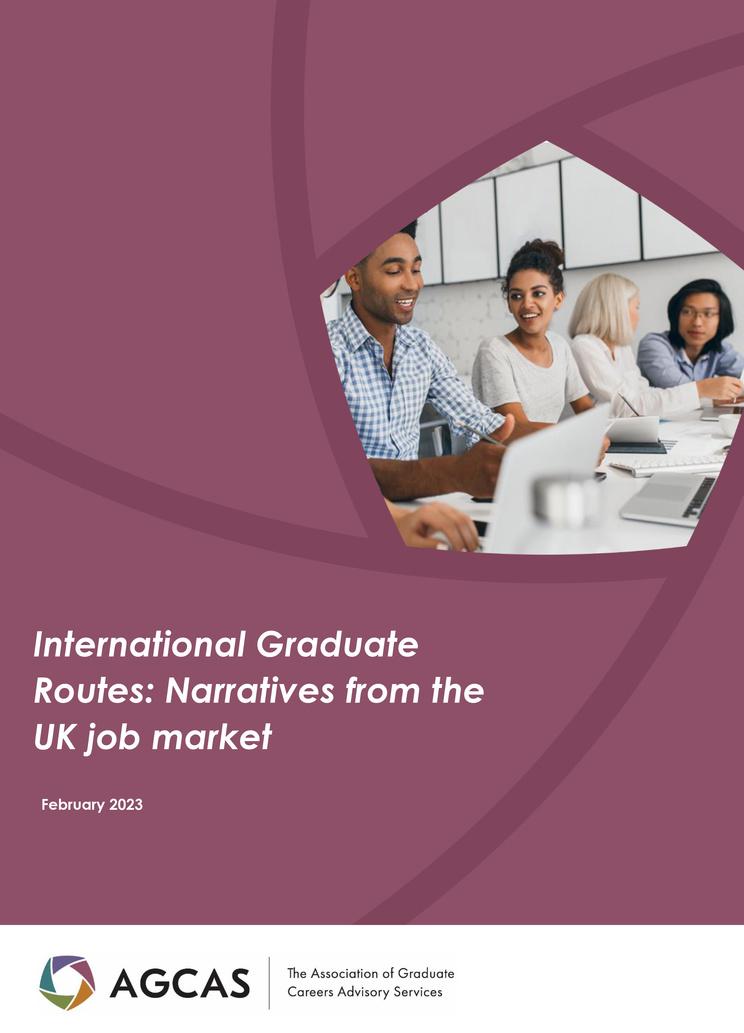

In February 2023, AGCAS published a research report based on a project led in collaboration with the International Task Group and funded by the UPP Foundation Drawing on both qualitative and quantitative data collected through an initial survey and follow-up focus groups, we aimed to better understand the facilitators and barriers to success for international graduates who choose to remain in the UK on completion of their studies
The research highlighted the importance of university/careers and employability service support and a positive university experience In the focus groups, international graduates talked about the support they received from their careers services One graduate advised others within their focus group to engage with their careers service due to their own positive experience:
“In my university, they really helped me with that…They just put you through how to work on your CV, so that you can actually get a job or prepare you for interviews as well.”
Through careers and employability service support, graduates felt that they developed their knowledge and skills, improved their confidence, and enhanced their CVs, covering letters, and interview techniques This was an important facilitator for many graduates in securing post-study employment
International graduates also benefitted from specific information and advice about securing post-study work visas, or bespoke/tailored advice for international students, provided by careers and employability services and the wider university Bespoke support for international students in relation to careers and employability is an important facilitator for international graduates remaining in the UK post-study Having access to those who are knowledgeable about both careers and employability and visas/issues affecting international students, potentially through cross-university initiatives and events, would enable these to be addressed in tandem
Many of the focus group participants referred to their university experience as positive, suggesting that their study was valuable and that their university provided a welcoming environment for international students Other facilitators included supportive and knowledgeable employers, work experience and skill development, planning ahead and starting early, and perseverance with job applications, alongside careers and employability service support
The most significant barrier for international graduates was a lack of employer knowledge and experience of employing international graduates on the Graduate route visa Almost all the international graduates within the focus groups told stories of job rejections due to their visa status, as well as some experiencing the withdrawal of offers once employers became aware of their status Though the Graduate route visa means sponsorship would not be required for two years, post-study international graduates encountered employer resistance due to their need for sponsorship in the long term
“I just got blanket rejections as soon as they found out that I was an immigrant. Even if I didn't need visa sponsorship, even if I was just applying for a position for six months and my visa allows me to work for two years, I just get flat out 'no'.”
Further collaboration between universities and employers could support employers to engage with international students whilst they are at university, and build international student awareness of employers which support the Graduate route and/or sponsor international graduates
Employers are also facing risks and uncertainty due to potential changes in government policies on international graduate immigration routes All employers, but particularly SMEs, ought to receive improved government support to mitigate these risks Careers and employability services should continue to promote guidance on recruiting international students to employers, for example as part of recruitment fair planning, or in employer newsletters
It is clear from this research that careers and employability services are doing great work which is valued by international graduates To support international graduates and help reduce some of the barriers they face, we make recommendations for policy makers, employers, universities, and careers services
Our careers service recommendations encompass continued collaborations with employers and other university teams Careers services could identify employers (both existing or new contacts) who embrace international students and offer them prioritised promotion opportunities to come to campus and deliver sessions
Collaboration with other university teams supporting the international student experience could also support international graduates in a holistic way For example, delivering joint workshops on the Graduate/Skilled Worker route with visa and immigration team colleagues and/or employability webinars for prospective students with international recruitment Careers and employability services could also continue to work with employer engagement teams to ensure confident conversations around inclusive recruitment practices and advocate for the entire student community.
READ THE REPORT:
International Graduate Routes: Narratives from the UK job market
florence.reedy@agcas.org.uk
Connect with Florence on LinkedIn
Connect with Florence on Twitter
ANNA LEVETT, Head of Service and CLAIRE

CRUX, Assistant Head, outline how the Careers and Employment Service at the University of Hertfordshire has adapted its service to meet the needs of their changing student cohort of predominantly international postgraduate taught learners

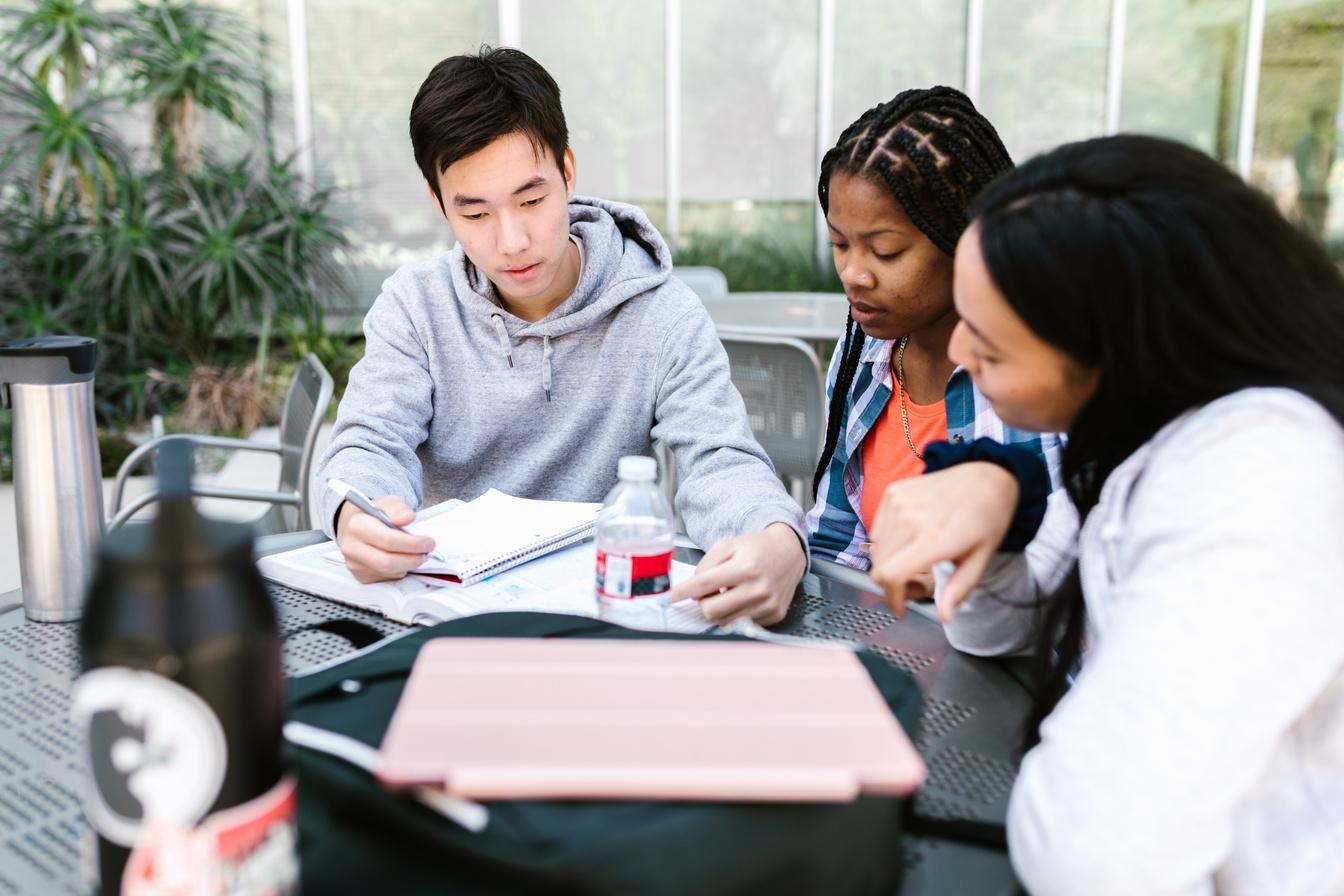
In the last 3 years, the international student cohort at the University of Hertfordshire has risen by 236% As a large proportion of this group are postgraduate taught (PGT) students with a placement option, this has resulted in an increase of 1054% of approved placement roles for this group As a service we have had to respond quickly to tailor our offering to meet the different needs of this cohort
One of the biggest challenges we ’ ve faced is the increase in demand for placements from postgraduate learners As a large majority of the learners are also international, visa rules are an additional complication which make processing placement approvals a lengthy task Initially, when the PGT provision grew more quickly than expected, we didn’t have the number of staff needed in the team to be able to process all the requests in a timely way Student satisfaction was impacted, both for those who were unable to find a placement due to the increase in demand from students, and for those who faced delays in processing times We had to completely overhaul our approvals process and bid for additional resource Thankfully the resource was approved, but we have learnt to keep a closer eye on predicted growth in student numbers so that we don’t find ourselves in the same position again predominantly by working closely with our International Recruitment Team
International postgraduate students tend to be high users of the service and often need additional support to respond to their complex needs These students are often new to the UK labour market and have CVs that are styled to meet cultural norms in their home countries Understandably, many students were booking multiple one-to-one appointments, which meant appointment availability was low overall We changed our approach to try and manage demand For example, we asked students to first put their CV through our CV feedback software and achieve a certain ‘ score ’ before booking an appointment We had to temporarily put a limit on the number of appointments per person, instead signposting to our online resources We created a version of our resource ’ s website specifically for international postgraduate students so we could better tailor messages and resources to them We also brought in a live chat function for quick queries, where an appointment might not be needed
Where we have very large PGT placement programmes, we worked with the schools to scale provision by designing and embedding content that would support students with preparing for and finding a placement We also offered drop-in sessions for placement queries at peak times, both on campus and via our live chat platform To ensure no students missed out, we designed a central support programme of workshops and webinars for any international student looking to enter the UK labour market We started to see appointment demand settle down, as access to our online resources increased and we were able to remove the appointment cap
Despite our success in managing demand for support, not all students managed to secure a placement. We spoke to some of the students to find out more and were told that in some of their home countries, it is common practice for the university to place the student with an employer without an application process Although we work closely with employers and promote their placements, some students struggle to secure a placement and the university offers an alternative research route for the second year of the masters We have worked closely with the Student Union to try and increase the awareness of our support, whilst managing expectations around the competitive nature of securing a placement or graduate job in the UK
Our work with employers has changed to reflect the cohort of international students Team members engaged in employer liaison activities now have a more prominent role in promoting international students to prospective placement employers Selling the wide number of benefits of taking on international students has become key, alongside changing the often-negative misconceptions about complex visa requirements for placement students We are yet to really see the impact of the Graduate route visa but promote it positively to employers when discussing placement opportunities, particularly to SMEs who still seem unaware of it
Following two student surveys about the start of term and student satisfaction with university support services, students fed back that they wanted more careers support before they arrived in the UK. This was helpful insight for us as we had introduced a lot of student support activities, but not necessarily pre-registration support. We have introduced webinars for international applicants to let them know more about the support available However, since the costof-living crisis, we have also had feedback that applicants want to know how to get a part-time job before they arrive in the UK, which is something we will introduce this year
We are trying to use different marketing methods to ensure our international students are made aware of all the support we can give them from when they arrive For example, we utilise social media and a team of student Careers Coaches that reflect the diversity of our cohort to provide peer-to-peer support
We have learnt a lot over the last three years about how to offer better PGT support, especially for international students Working with other departments to ensure we know what changes might be planned for future cohorts will help us stay one step ahead Student voice continues to be key and listening to and working with these students and the Student Union has helped move us further forward with adapting our services There is still much to do, and we will be carrying out additional research with our international PGT cohort to ensure we are understanding their unique challenges fully and supporting them in ways that most suit their needs

Working with other departments to ensure we know about upcoming changes will help us stay one step ahead

DHUGGA, Warwick Award Manager, at the University of Warwick, outline how the new Warwick Award enhances postgraduate employability through identifying and articulating skills students gain both within and alongside their studies.

The Warwick Award is a new, institution-wide skills award for undergraduate and postgraduate taught (PGT) students at the University of Warwick It recognises students’ employability skills development, both within and alongside their studies Based around the 12 Warwick Core Skills (see diagram), it enables students to think more deeply about the skills they already have, identify those they wish to develop further, and consider how they will articulate these skills to employers The Warwick Award launched in October 2022, with just under 9,000 students enrolled in its first year
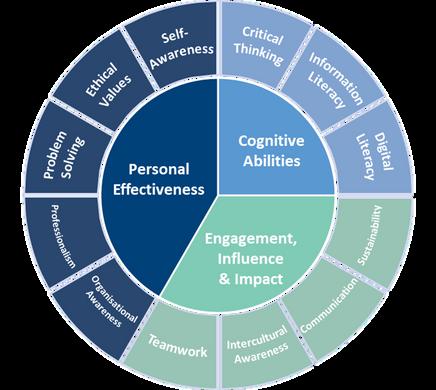
The Warwick Award recognises a wide range of skills development activities, meaning that students can create their own individual path through the Award by selecting the activities most relevant to their interests, availability, skills development needs and career goals Recognition of selected academic modules, as well as commitments such as part-time work and caring responsibilities, means the Award is accessible to students who are not able to engage in extracurricular activities such as societies or sports, but who are nonetheless developing their employability skills
The Award was co-created in partnership with students, colleagues, and employers, with particular care taken to understand and incorporate the needs of underrepresented students Consultation with postgraduate student representatives, Student Union elected officials, the Widening Participation team and other underrepresented student groups provided a broad understanding of the barriers to engagement that some students face This enabled us to design the structure of the Award to mitigate them It also helped us to create a specific postgraduate stream of the Award that best suited the needs of this student community
The University of Warwick encourages underrepresented students to consider postgraduate study through a range of initiatives, many of which are recognised by the Warwick Award The Undergraduate Research Support Scheme, promoted by the Warwick Award, particularly targets underrepresented students and enables undergraduate students to conduct a funded research project, gaining research experience and developing their interest in postgraduate study The Widening Participation network and the Warwick Scholars programme provide further support, encouraging engagement in the Warwick Award amongst underrepresented student groups 25% of home undergraduate participants in the Warwick Award pilot were widening participation students
The Award helps students identify the skills they can offer to employers and recognise the skills development in activities they may not have previously thought relevant
The Award is administered through a bespoke digital platform provided by GradIntelligence When students register online for the Award, they are invited to complete a short skills self-assessment to rate their experience in each of the Warwick Core Skills The results of this self-assessment inform the tailored activity recommendations that they subsequently receive Upon completion of an activity, students must take part in a short reflective exercise before the activity can be recognised by the Award The use of a digital platform means that this process of self-assessment, active development and reflection can be scaled up to reach large numbers of students, providing an additional careers support resource for postgraduates

To ensure accessibility, and to help students recognise the important employability skills they are gaining through their studies, the Warwick Award recognises over 550 academic modules To achieve recognition, modules must demonstrate that they address the Warwick Core Skills and incorporate a reflective exercise of some kind There has been considerable interest from academic departments in having their modules recognised by the Award, enabling us to work with academic colleagues to embed employability in modules which do not yet meet this benchmark, and extract employability from modules that do, so that they can achieve recognition
The increasing number of postgraduates who study part time or online meant that we needed to expand the skills development activities included in the Warwick Award beyond those offered on campus To recognise where our part-time or distance-learning students may be developing their skills, the Award recognises offcampus activities including employment, parental or other caring responsibilities and online training It also promotes virtual work experience opportunities through third party providers such as Forage The flexible structure of the Warwick Award means that students can register at any time during their studies and vary their level of engagement depending on their availability and the structure of their course
The Warwick Award’s accessibility is demonstrated by the high engagement amongst international PGT students (approximately 45% of Award participants are international PGTs) This is a group which has traditionally had low engagement in extra-curricular activities such as student societies, although international PGT students have, through the Award, demonstrated skills development in a variety of contexts For example, the Award recognises international students’ experience at Warwick as a study abroad experience, enabling students to reflect on what they have learned from their time with us and how the experience has contributed to their development
Accessibility is also important to the employers we consulted when developing the Award, many of whom wish to increase their recruitment from under-represented student groups By encouraging students to consider a broad range of activities, beyond internships and student societies, the Award helps students to identify and articulate the skills they can offer to employers and to recognise the skills development involved in activities that they may not have previously thought relevant
By formally recognising skills development through such a wide range of activities, the Warwick Award helps students to see the value of experiences which they may not otherwise have considered worthwhile, but which employers value highly Reflecting on these experiences enables students to build a bank of examples that they can expand upon when applying for jobs or further study, and builds students’ confidence in their employability skills, regardless of the context in which they gained them
Ali.Collins@warwick.ac.uk
Parmjit.S.Dhugga@warwick.ac.uk
Students can create their own individual path through the Award
We aimed to bring together our specialist experience of working with these PGT cohorts and the markets they aspire to, with our values of inclusive education and collaborative learning In effect, we were striving to answer three key questions:


DANNY WILKEY and RUPINDER MORROW, Senior Careers Consultants, showcase the King’s Business School (KBS) personalised and integrated model of careers education for MSc Finance students Here they highlight how the successful integration of career learning, market insights, and employer engagement into the curriculum at scale, in the form of Career Impact Programmes, can create maximum impact for students.
Students are attracted to King’s for its reputation for global relevance and rigour Our students are drawn from several countries, with a preponderance from the APAC region Our top three countries for student numbers are China, India and the UK Students arrive with a similar ambition of securing a graduate level role in finance but with differing levels of career readiness and experience
The careers team at KBS aims to provide an inclusive, timely and expert careers offering to all our students We have designed and developed Career Impact Programmes (CIP) based around the learning and successes of our career support to our MSc Finance students These 3-day CIPs specifically target 6 postgraduate taught (PGT) Finance programmes (around 800 students) The incredible challenge, change and fast-paced innovation which we experienced during the pandemic meant that a pivot to online, borne out of necessity, quickly became an opportunity to reimagine scale, reach, inclusion and personalisation of our career support
How can we provide an inclusive career learning experience at scale, that meets the employer and alumni appetite of our students in formats that are deliverable?

How can we place students at the centre of the learning experience, co-creators of their career learning and building effective communities of interest and practice?
How can we use creative pedagogy to ensure we honour the different profiles, cultures and readiness levels in our programmes, while shining a light on market expectations and deadlines?
We understand the value of supportive academic colleagues and found that our reputation and the success of previous programmes converted faculty into Career Impact Programme Champions Faculty staff created space in their timetables and amplified our messages in inductions and committees As a result, we were allocated valuable timetabled space in terms one and two to run bespoke three-day Career Impact Programmes (CIPs) Both CIPs combine the following elements:
In depth personalisation and the establishment of clusters of need through surveys, polls, focus groups and regular career lounges
Multi-modality delivery (employer sessions, masterclasses, alumni enrichment)
Highly tailored content with strong pedagogy including quizzes, videos, flipped classroom activities, individual, pair and small group activities
Collaborative creation with students, alumni and employers
Each CIP offered a balance of careers consultant and employer led interventions, which acknowledge different stages of career readiness and learner autonomy. Pedagogical decisions were critically evaluated through the lens of what would work for these cohorts of students Collaboration was key to the success of the project, which included outstanding support from our Head of Careers, Work Related Learning Manager and Careers Coordinator
Career education was of course a significant proportion of the content, encouraging students to take ownership of their career with the requisite scaffolding available to meet differing levels of readiness and confidence. Sessions included:
Video interviewing:
We created student video interview recordings with actual time restraints to spotlight the 'lived experience' of this recruitment methodology We then invited students to provide some 360 reflections, in particular to comment and critique the commercial awareness and communication skills they observed in both a strong interview performance and in a performance with a number of development areas Students were encouraged to build on these reflections in their engagement with both our online interview tools and interview coaching sessions
Technical Interview Theatre show:
440 students had the opportunity to observe a live technical interview by two “actors” from SEB playing themselves It showcased what excellent looks like and gave students the opportunity to benchmark their market readiness
The Buy / Side sell side discussion:
This introduced the important external perspective Designed to develop market understanding, our market professionals enlivened this by connecting it to the skills and the human experience of different roles Many students arrive at Kings with a ‘How’question – how do I get in to This session provided answers to the ‘Why’ – Why buy side / why sell side? Designed to inform career decision making, it also provided a call to action for students to target their enrichment activities that offered the biggest return
The Career Impact Programme achieved a number of key objectives Its scale and reach surpassed all previous endeavours, with session attendance peaking at 445 students We have built capacity for the future with a bank of recordings and successful session outlines to enrich next year ’ s offer Student feedback and engagement was phenomenal with students stating they were, “learning so much about the real world of finance” and “ as an international student I found the Career Weeks very useful, especially as I was unaware of the hiring process and requirements for the UK market, which was covered very well.”
The right pedagogy, the right atmosphere and creative thinking was matched by student enthusiasm to co-create and make a difference to their career learning experience. There were a number of “ success factors” that stand out:

In depth relationship building with faculty
Establishing a core careers team, Head of Careers, Work Related Learning Manager, Careers Coordinator and two Senior Careers Consultants to ensure seamless delivery Active listening to students through polls, surveys and adaptive, flexible sessions
Culturally sensitive content and deep knowledge of context was rewarded with student commitment in group activities and the leadership opportunities ceased
Our ethos was to ensure all students were supported irrespective of their starting points and levels of career readiness, in line with Kings Vision of inclusive education: “Everyone, regardless of background is able to participate fully, to learn and fulfil their potential ”
Collaboration was key to the success of the project
TERESA CORCORAN and SALLY CLEERE, Postgraduate Careers Consultants, reflect on the employability and career development support provided to the majority international postgraduate taught students at Nottingham University Business School, and outline how they address common barriers experienced by postgraduate taught students.
Nottingham University Business School’s Postgraduate Careers

Team work in an integrated way to provide career development support to a diverse cohort of international students, including preentry to lifetime graduate support 85% of our cohort are international, representing over 50 countries Our student population rose by 126% between 2016 and 2018, and while numbers dipped slightly during the pandemic, they are nearing pre-pandemic levels now This increase meant we needed to be more global in our approach and scale up provision without compromising quality
As employability support is a key driver in international student decision making and satisfaction, as noted in UPP Foundation research, we get involved in international recruitment activities and support academic colleagues with pre-entry offer holder course talks, ensuring potential students understand that career development is a key part of their course
In summer, pre-entry students receive three online bespoke sessions The first session covers UK graduate recruitment methods, opportunities and key visa and immigration information and support Next, we cover resources for finding work outside the UK In the third session, we invite MSc graduates to share their experiences of living, working and studying in the UK, providing a platform for networking In the MSc student induction, the careers team offer a team building session that introduces the core Accelerated Career Leader Programme (ACLP)
The MSc career development programme is embedded in the curriculum, running each week for all 1100 MSc students The ACLP received 97% student engagement in Autumn 2022 In semester one, we run interactive sessions covering insights into CVs, employer testing, assessment centres, LinkedIn and interview skills Students complete weekly follow-up work and receive formative feedback Students earn an ACLP Digital Badge in gold, silver or bronze, recognising their commitment to their career development
The semester two Global Career Insights Series (GCIS) includes weekly sessions with alumni and externals working in areas including Consulting, FinTech, Data Analytics and Banking and Investment Students network and gain sector insights from experts working in their key sectors of interest Over 70% of attendees rated the recent Consulting Sector Insights session as 5/5 Students commented that the session was 'professional and impressive' and provided 'insightful knowledge on getting into a consulting role'
We enhance the programme through specialist external support, including training in practical networking techniques that are later applied in an engaging networking event with external professionals We also provide Consulting Sector Insights from Don Leslie and Immigration Briefings from Paragon Law

‘The NUBS PG Careers ACLP program gave me the global exposure and networking opportunities I needed to build my confidence and secure a part-time job in Marketing. It has been a transformative experience that has opened doors to opportunities I never even knew existed.'
Through our work, we have identified common barriers which impact our taught PGT students, including a lack of access to professional work experience and barriers to entry for Summer Internships We have partnered on initiatives within the university and Business School to overcome these
Postgraduate Placements Nottingham (PPN) offers support to large and small employers Employer Engagement colleagues across the University are tasked with sourcing the projects and ensuring the work is of the correct skill level The projects meet a need for professional level work experience for postgraduates, using students’ analytical and research skills to support organisational needs The paid projects are funded by the university and the organisations and are usually 100 – 200 hours in length They comply with international student working hour restrictions and can run at any time of year This means they are a vital source of professional level experience for international postgraduate students who are unable to access full time summer internship opportunities due to the working hour visa restrictions
Student feedback on the PPN is very positive, with a 2022 MSc HRMO student recently commenting: 'The PPN provided my first exposure to the UK job market, helped me build credibility as a HR professional and gain transferrable skills and technical understanding It was pivotal in helping me gain my current HR Management role' Feedback from organisations who have taken part in the scheme is also very positive
‘The students have provided extensive literature reviews, produced detailed analysis, and cost benefit analysis where appropriate… they have produced and delivered presentations at internal and external meetings… I unreservedly recommend The University of Nottingham Postgraduate Placements scheme.’ Benchmark

In 2021, to address the lack of professional work experience opportunities for MSc students, a team of academic and professional services colleagues developed the first Company Based Challenge A range of companies were invited to share real business issues they were facing for students to address This ranged from opportunities for a confectionary company to tap into the corporate gifting market, to strategies to increase online equipment sales for a racketball social enterprise
In the first year, 40 places were made available to students who achieved 65% or above in semester one Working closely with the companies who set the challenge and being mentored by experienced professionals helped students to research and present solutions to the companies in just three weeks
Throughout the challenge, students contributed to a reflective blog which highlighted increased confidence in a wide range of professional skills. It helped students articulate their experience which they then applied to their CVs, with some students using the experience to secure a PPN. Now in its third year, the Company Based Challenge has increased to offer up to 150 places and support for students has developed to include effective team working, reflective writing, project management and presentation skills. The companies have been so impressed by the depth of research carried out by students and the creative proposals, that some take part every year.
The NUBS Postgraduate Careers team will continue to explore new initiatives to enhance postgraduate taught employability provision
We hope these insights have given you some new ideas to support your own postgraduate cohorts
NUBS recently ringfenced a number of projects for MSc students, part-funded by the school. We have set up a new project with an IT Consulting firm to evaluate how they can increase their sustainability. A further project is researching the underlying reasons behind a specific minority group ’ s reluctance to access health care services. The research findings will hopefully form part of a white paper report and feed into NHS research. We plan to grow the PPN provision and have recently gained additional funding to support even more projects ringfenced for MSc students in the Business School.
teresa.corcoran@nottingham.ac.uk sally.cleere@nottingham.ac.uk
Consulting Limited
‘We’ve already seen so many benefits emerge from the scheme, and we can’t wait to see what the next four months will bring!’ Research Consulting, Nottingham
Postgraduate Careers Coach and HANNAH ALLISON, Careers Widening Participation


Manager at Lancaster University share their experiences of implementing a programme for widening participation students around postgraduate study. This includes initiatives aimed at final-year students thinking through whether postgraduate study is right for them and supporting taught postgraduate students in their next steps.
At Lancaster University, widening participation (WP) students (students from underrepresented backgrounds) have the option to join GROW Your Future (GYF), a careers programme which aims to ‘ grow ’ students’ career plan, employability skills, career confidence, and professional networks

Following 2021 research conducted by Sue Edwards (formerly of Lancaster University) into first generation students, which found that it was important to present postgraduate (PG) study as a realistic option, and influence the balance of other narratives, GYF launched a WP Postgraduate Careers Coach role Contact Sue Edwards for more information about this research
This was a brand new role, so we considered other studies conducted around postgraduate study, and utilised research completed within our institution around how to tailor careers provision for postgraduate taught (PGT) students. This article will give some examples of how this role has supported both undergraduates to consider PG study, and WP PG students in their next steps.
We all know the impact of one-to-one appointments within careers, so first we implemented a coaching scheme. Meeting regularly with a careers coach creates continuity and familiarity so that students gain confidence and feel comfortable within these interactions, encouraging a sense of belonging and building of social capital that may not be achieved by a one-off appointment
The strength of connection with the careers coach allowed for a deeper reflection regarding further education using visual tools such as Systems Theory (Patton and McMahon, 1999), to build awareness of any internal/external influences that had positively/negatively impacted decision making thus far, and discussing how these created barriers for postgraduate study
Furthermore, implementing themed workshops addressing common concerns has also encouraged peer connections For example, when delivering the session, ‘GROW Your Confidence Controlling Imposter Syndrome’, students identified a lack of confidence and belonging in various situations and openly empathised with one another's dilemmas Workshops like these support building the GYF community, increase a sense of belonging at university, and probability of continuing to pursue further study
As part of the support for WP students, we build in bespoke workshops which challenge students’ perceptions of studying a masters and barriers surrounding this For example, implementing Careership Theory (Hodkinson and Sparkes 1997) within a GYF workshop, ‘Developing Professional Networks and Expanding Horizons’, was an effective strategy for getting students to identify their ‘Horizons for action’ This led to discussions around barriers to further study and actions they may take to extend their horizons Utilising the theory’s concept of ‘fields’, ‘interactions within a field’, and ‘habitus’ helped demonstrate the effectiveness and function of students’ networks and how their position within a particular ‘field’ may be limiting their knowledge, understanding of industry and benefits of further study Demonstrating that dispositions within a particular field can change instilled confidence and motivated students to explore expanding their networks
We know that GenZ students think more about the wider impact of their work, therefore we introduced the Japanese concept of Ikigai (loosely translated as ‘ a reason for being’) in workshops and oneto-ones. The Ikigai framework contributes to a ‘satisfied life’ and includes a section on ‘what the world needs’, thinking about LMI. We use this to get WP students to evaluate their strengths, motivations, values, and a breakdown of how they use their time, to consider the impact of their future careers, with reflection on how gaining higher level skills would feed into a variety of job roles
Any WP student can access this service, however, most students who take part will come from GYF, and all PGT students who sign up for GYF are contacted and offered the coaching support. We promote this provision throughout the university, utilising social media campaigns, but also embedding within support for finalyear students. Finally, we collaborate with services that also support PG students, and work within the wider careers team to promote the service on offer.
We know that individuals benefit from this coaching approach, meeting individuals where they are at, and broadening their horizons for action Utilising theory to address barriers and selecting relevant themes for workshops helps students identify with others like themselves, increasing confidence and building upon their social/cultural capital. Regular contact with the careers coach via individual meetings and workshops fosters familiarity, trust and supports instilling confidence to pursue further study and knowledge of this ‘field’.
Employability outcomes evidence indicates students are successful in getting accepted onto a variety of masters programmes and PhDs, as well as graduate schemes and jobs.

l.bromley2@lancaster.ac.uk
h.allison1@lancaster.ac.uk
Connect with Laura on LinkedIn
Connect with Hannah on LinkedIn
Connect with Hannah on Twitter
We challenge students’ perceptions of studying a masters and barriers surrounding this

ELSA ZENATTI-DANIELS, Postgraduate Student



Development Lead, College of Business and Social Sciences, DANIELLA BARNICLE, Careers Consultant – International, Careers and Placements and PEGGY VAZOURA, Careers Consultant – MSc Business, Careers and Placements at Aston University outline how they support international postgraduate business students become work ready by integrating employability in a 12-month masters programme
The Aston Global Advantage (AGA) professional development module in the School of Business and Social Sciences (BSS) was launched in 2013 to create a bridge between Masters Business degrees and the world of work Credit-bearing and embedded in all our 12-month masters courses, it is built upon the pillars of employability, global citizenship, experiential learning, and reflective practice Throughout the course, our postgraduate students are encouraged to learn by doing, with a focus on responsible management and developing a sustainability mindset Three dedicated teams support the programme: the BSS Student Development Team, Careers and Placements (C&P), and a team of academic members of staff
The module has three elements: a team-based business challenge in term one, industry-focused workshops and guest lectures in term two and a choice of one of four experiential learning streams: study abroad, work-based experience, business simulations and PIPE (Product Intellectual Property and Entrepreneurship) which students undertake in term three The module is supported throughout the year by an extensive careers programme which comprises both compulsory and optional sessions
To ensure that all students can attend all related teaching and activities, we have a dedicated “AGA day” when no other teaching takes place Each of the three elements of the module have a dedicated assessment which encourages reflective practice and makes use of an Aston-designed competency framework: the skill wheel In this article we will focus on the work-based experience stream and the tailored careers provision to support this
Over 90% of our Postgraduate Business students are international By making the AGA credit-bearing and compulsory, we offer them the opportunity to start a professional level placement six months into their 12-month course As this is an integral and assessed part of the course, international students can work full-time hours during the approved period of the placement as long as it does not exceed 50% of the length of their course This gives students a head start into their career journey in the UK
The Student Development team, in collaboration with C&P, source and manage opportunities for the work-based experience stream Students have the option to either find their own placement or apply for one of the three in-house initiatives: the virtual internship scholarships, our Aston Business Clinic consultancy projects or our exclusive paid placement opportunities with profit and non-profit organisations
Liaising with employers to create paid opportunities for our predominantly international postgraduate students has been a challenge. Hence last year, C&P got approval by the Aston Business School to financially support a number of these placement opportunities via an Aston Placement Bursary Scheme As a result, we are presently onboarding more regional SMEs to recruit our international postgraduate students, allowing the team to scope out inclusive and accessible roles
In 2021/22 and with two student intakes in September and January, over 1200 Masters Business students joined our university Over 400 postgraduate students secured work-based experience as part of the AGA, many of them in paid full-time roles The three in-house initiatives alone have allowed us not only to reach our original target of a minimum of 25% of our taught postgraduate population taking on a placement working with real employers, but to exceed it by 10% despite an extremely challenging environment
For the last 15 years, Postgraduate Business students have benefitted from the support of a dedicated Careers Consultant. The AGA compulsory careers programme assumes no prior exposure to careers education given the international makeup of the cohort, and takes students through the stages of career planning, accommodating career starters, changers and developers.
As the numbers of postgraduate students have been drastically rising (recruitment doubled in 2021/22), our key challenge is to maintain at least the same level of quality teaching and support. This increase – based on the introduction of the Graduate route visa and our growing reputation – has also resulted in the creation of 13 new roles into key areas such as student development and tutoring support, placement approvals, postgraduate communications, and employer engagement across the three teams, evidencing the university’s investment into the AGA Programme
Key in this recruitment drive was the creation of the International Careers Consultant role, who has been delivering new workshops in conjunction with the visa team and languages department Key topics include the UK labour market and navigating visa conversations with employers We have also created a suite of support around ‘life after graduation’ Recent completers are invited to our alumni networking events and to a dedicated WhatsApp group, to connect with recent alumni who are working in the UK Students looking to return home are supported via alumni links and external websites, which advertise roles globally
Furthermore, our support to offer holders from India and Nigeria has increased in collaboration with the in-country agents and our regional managers. We introduced a pre-arrival careers and employability workbook and deliver a series of pre-arrival careers sessions to enable career readiness, manage expectations and do some myth busting.
We know anecdotally from our students and annual surveys that one of the key influencing factors in choosing to study at Aston Business School is the AGA programme The success of the programme, even with online delivery through Covid, would not have been possible without the unique cross-departmental project team of careers professionals, support staff and academics
The AGA model is assessed via a reflection of the individual’s skills Linking their AGA experience to the labour market, it encourages students to compare their strengths and gaps against roles they are applying for. This model puts Aston University Business School at the forefront of innovation, replicating what other universities deliver at undergraduate level. With the increasing number of international students in the UK and scrutiny over whether they are 'paying more for less' (HEPI Report 143), data collection and analysis will be imperative in continuing the ongoing tailored support and positive outcomes of the AGA.
e f zenatti@aston ac uk
p vazoura@aston ac uk
d barnicle1@aston ac uk
Connect with Elsa on Linkedin

Connect with Daniella on Linkedin
Connect with Peggy on Linkedin
We challenge students’ perceptions of studying a masters and barriers surrounding this
Students develop their own unique career map

KATIE STRIPE, Senior Learning Designer and KATIE DALLISON, Careers Consultant, at Imperial College London discuss how they created Attributes and Aspirations, an inclusive, tailored online course which allows taught postgraduate students to engage with their career and skills development at a time that works best for them
Attributes and Aspirations (AA) is an interactive, self-directed online course that was created to address the following overarching challenges that we often encountered when supporting the career and skills development of taught postgraduate (PGT) students:



How do you make PGT careers and skills development personal, diverse, equitable and sustainable for today’s everchanging and ever-increasing student base?
How and when do you engage your PGT students given their high workloads and the early timelines of the UK labour and research markets?
AA was developed specifically for taught postgraduate students to help them make decisions about their professional futures It includes eleven modules that cover career skills such as writing application documents and preparing for interviews, and professional skills such as team working, decision making, problem solving and communication These modules are interlinked but designed to be taken individually on a timeframe that is chosen by the student
This is facilitated by a comprehensive skills map that presents twenty skills, defined by research into university graduate attributes, employer requirements, and the World Economic Forum’s skills for the future workforce This map links skills to the units in which they are covered to enable students to create their own journey through the content However, each module, and the units within it, can also be used in isolation which means that academic teams can select specific areas to embed within their curricula Critical thinking, time management and project management are particularly popular for this This has given departments evidence of transferable skill training for meeting external accreditation requirements and also acts as marketing to encourage students to access other content
AA is delivered through the institutional Virtual Learning Environment, Blackboard This allows students to self-enrol on the modules of their choice using their college credentials Each module provides students with progress tracking and a completion certificate which can be downloaded as soon as the content is completed

One of the foundations of AA is Plan: Me As the students engage with their chosen content, they develop their own unique career map and reflective journal, their Plan: Me They reflect on aspects of the course and use this knowledge to develop their career ideas The introductory modules of AA teach students the basics of designing their own Plan: Me, and how to think and write in a reflective way We offer our students several methods for creating their Plan: Me including OneNote, Padlet, and paper, so the portfolio is personal and meaningful to the individual Plan: Me is also used throughout the Imperial College Careers service and by personal tutors so career and professional advice is integrated
The other fundamental feature of AA is that it can be bespoke for different cohorts We currently have versions of the course for three different faculties, presenting industry-specific examples to tailor the career related aspects of the course to a specific cohort
Our first pilot went live to students on the first day of term, however, whilst engagement was good initially, as soon as assessment deadlines and compulsory university work emerged, AA became secondary We noticed that other courses had better uptake by releasing their content to students before the start of term
We now run AA in this way to allow students time to understand the course before they become too busy, enabling them to plan better for the year ahead This, combined with live webinars from the careers service and a presence at induction talks across faculties, has resulted in enrolment numbers rising for the fourth year in a row, with a 25% increase between 2021and 2022
A core feature of AA is the mock students, which act as narrators for some units, providing exemplar material or acting as pseudostudents that our actual students can relate to. By integrating these personae, we create more realistic scenarios and activities, and make the content more inclusive. We now have over 16 personae, from a wide range of courses and backgrounds with CVs, dreams, hopes and life stories. These personae also help our students to better understand their peers, with activities designed for the students to advise the mock student on their next moves and support them in developing transferable skills. By helping the students see themselves in our personae, we know from feedback that they connect better with the content. During our initial pilot, feedback showed that students became very invested in their new mock friends and in response to requests, we added an extra unit to explain the next steps in their careers
Since the first version of AA was developed, it has grown in ways we did not anticipate We have developed a PhD version which contains a graded reflection piece and is a compulsory part of a doctoral training programme run by the Faculty of Medicine The independent but interlinked nature of the units and modules allow a lot of flexibility with how AA can be used
As our initial five-year project enters its final year, we are looking forward to conducting a full evaluation of AA and identifying some key research areas to explore While it is too early to see the impact on Graduate Outcomes, we are hoping this will form an element of our research We are currently developing personae and adapting transferable skills units to support the Imperial Award scheme and we are working with widening participation colleagues to develop and roll out an undergraduate version of AA
k.stripe@imperial.ac.uk
k.dallison@imperial.ac.uk
Connect with Katie S on LinkedIn
Connect with Katie D on LinkedIn
ANNA MURRAY and JOANNA HARRIS, Careers Advisers at Cardiff University, outline the tailored employability support accessible to international postgraduate students, with a focus on the provision in Cardiff Business School


In 2021/22, Cardiff University had 33,985 students enrolled, representing over 141 countries. This included 7,530 international domicile students (non-EU and EU included), 54% of which were postgraduate taught (PGT). To support this cohort, there has been a growth in dedicated employability support, most notably in the Business School where numbers of PGT and international PGT students are greatest
The Business School offer a wide range of employability sessions throughout the year for PGT programmes, including sessions tailored to specific industry sectors and masters programmes themselves The careers team works in conjunction with academic staff to embed employability in a variety of ways
The Cardiff MBA launched in 2020 and as a result, the Career Advantage Service was established, offering a package of support to MBA students This includes an employability module which runs alongside an accredited MBA Leadership Development module Careers workshops incorporate Design Thinking methodologies and neurolinguistic programming techniques to support career planning and transitions We also hold an annual virtual MBA Employer Showcase event, in conjunction with the universities of Bath and Exeter, to allow employers the chance to meet talented MBA students from all three institutions, which has led to several recruitment successes as a result
The Business School’s MSc Business Management programme has an optional professional placement year and to support students’ search for placements we developed an electronic ‘Pathway’ - a collection of online videos and resources which provide a seamless workflow for students and a reliable system for tracking engagement We also run in-person careers sessions, employer events, drop-ins and offer one-to-one careers and employability support from a dedicated postgraduate Careers Adviser and Placements Officer
Several other PGT programmes in the Business School have live business projects embedded into modules and the university also sources a wide range of flexible work experience opportunities that can be undertaken alongside studies

We work with employers to dispel the myths around the visa system
The PGT community in the Business School is made up of over 90% international students and one of the greatest challenges we have seen is students having a lack of understanding around the UK graduate recruitment timeline We are also aware of the difficulty international students have in articulating their right to work in the UK to employers We have implemented a range of measures to support international students with these challenges:
1 We have added careers information to pre-arrival communications, supporting induction week and throughout the autumn semester to emphasise the need for students to start their job search early
2.We tailor content accordingly when developing careers and employability sessions – breaking down barriers in language / terminology used by employers, explaining recruitment timelines and raising students’ awareness of how to access support in making competitive applications and articulating their eligibility to work in the UK.
3.We provide guidance on completing application forms to enable international students to overcome barriers in the recruitment process.
4.Our Employer Engagement team also advocate for international students, checking each job posted and making sure right to work statements meet guidelines
5 The introduction of the Graduate route visa has prompted the university to engage the services of a local immigration law firm to deliver information sessions to students regarding the Graduate route and Skilled Worker visa

To support our work, a dedicated intranet page for international students has been produced by a Careers Adviser containing information and advice on visas, finding employers that sponsor, explaining right to work in the UK and tips on job searching inside and outside the UK
Cardiff University is a member of the ISE and GRN (Graduate Recruitment Network), who hold regular webinars and updates on student employability matters and help bridge the communication between HE providers and graduate recruiters We try to stay in touch with the views of our employer partners about the Graduate route visa This includes sending surveys to explore employers’ opinions on hiring international postgraduates and finding new ways of educating and informing our external partners through news bulletins, for example We also have employer-facing content on our website providing advice, recommended by AGCAS, on employing international graduates In March in the Business School we delivered a Breakfast Briefing to local businesses on ‘Recruiting International Talent’, to dispel the myths around the visa system and promote the value in hiring international graduates
In summary, as a careers service we understand the importance of providing parity of service to postgraduates and undergraduates alike and are working hard to find innovative ways of dealing with the complexities and challenges faced by international postgraduates entering the UK labour market We feel we have a duty to respond to the needs of these students and to engage with and work closely with graduate recruiters, to understand their individual needs and concerns, so that we can work effectively to mitigate those concerns and enable greater mobility of our overseas and home postgraduates
We promote the value in hiring international graduates to employers
Task Group, share how a restructure of the group membership and relaunch of key activities sets the scene for the Task Group’s focus in 2023 and beyond Find out how the Task Group is working for you to enhance resources, share best practice and build a community.
With the growth in PGT numbers and the increasingly diverse makeup of the cohort, it is crucial now more than ever that the AGCAS Postgraduate Taught (PGT) Task Group is well set up to support AGCAS members. With a recent restructure of the group membership, one of our first priorities has been to reflect on our mission and set out how we can help the AGCAS community embrace the opportunities and challenges of developing careers support for their PGT students.
The range of articles in this issue highlights the breadth of work the community is engaged in, so let’s use this as a springboard to identify common challenges and to work together The priorities of the Task Group include:
We want to create a proactive network of PGT careers professionals, to allow the sharing of best practice and provide a supportive community On 16 May 2023 we will host a Discussion Forum for AGCAS members working with PGTs to share their experiences, ask questions and request support from the Task Group and the AGCAS community The virtual discussion forum will be led by Task Group members with a focus on careers resources for PGTs and employer engagement An introduction will set the scene before breakout groups to share best practice
We are making use of AGCAS Connect and invite you to ask questions there, and we look forward to in-person discussions at the Annual Conference in June
We are also looking to collaborate with other Task Groups PGT students come from a diverse range of backgrounds and it makes sense to tap into existing expertise We are planning future joint activities with the International Task Group to make the most of linkages between our activities
The PGT cohort is often second consideration to undergraduates when it comes to analysing and reporting on essential data We are developing our Task Group webpages to create a resource bank where PGT-relevant data, publications and research are signposted to help anyone involved in supporting PGT students
You can find an initial bank of links to useful research and articles on the AGCAS Postgraduate Taught Task Group webpage
We are creating a set of case studies to highlight interesting work in universities across the country The case studies will cover all aspects of the PGT student journey from pre-arrival through to alumni support and will highlight the diversity of the postgraduate population and the variety in modes of delivery
Would you be happy to share your work, and reflections on your practice?
Submit a case study
Members of the PGT Task Group
Jayne Sharples, University of Birmingham (Co-Chair)
Janice Simpson, University of York (Co-Chair)


Caroline Baldwin, University of Bath School of Management
Katie Dallison, Imperial College
Amy Longsden, University of Leeds
David Mashiter, Lancaster University
Jim Reali, University of the West of England
janice simpson@york ac uk
j.s.sharples@bham.ac.uk
Connect with Janice on Linkedin
Connect with Jayne on Linkedin
Connect with Janice on Twitter
Connect with Jayne on Twitter
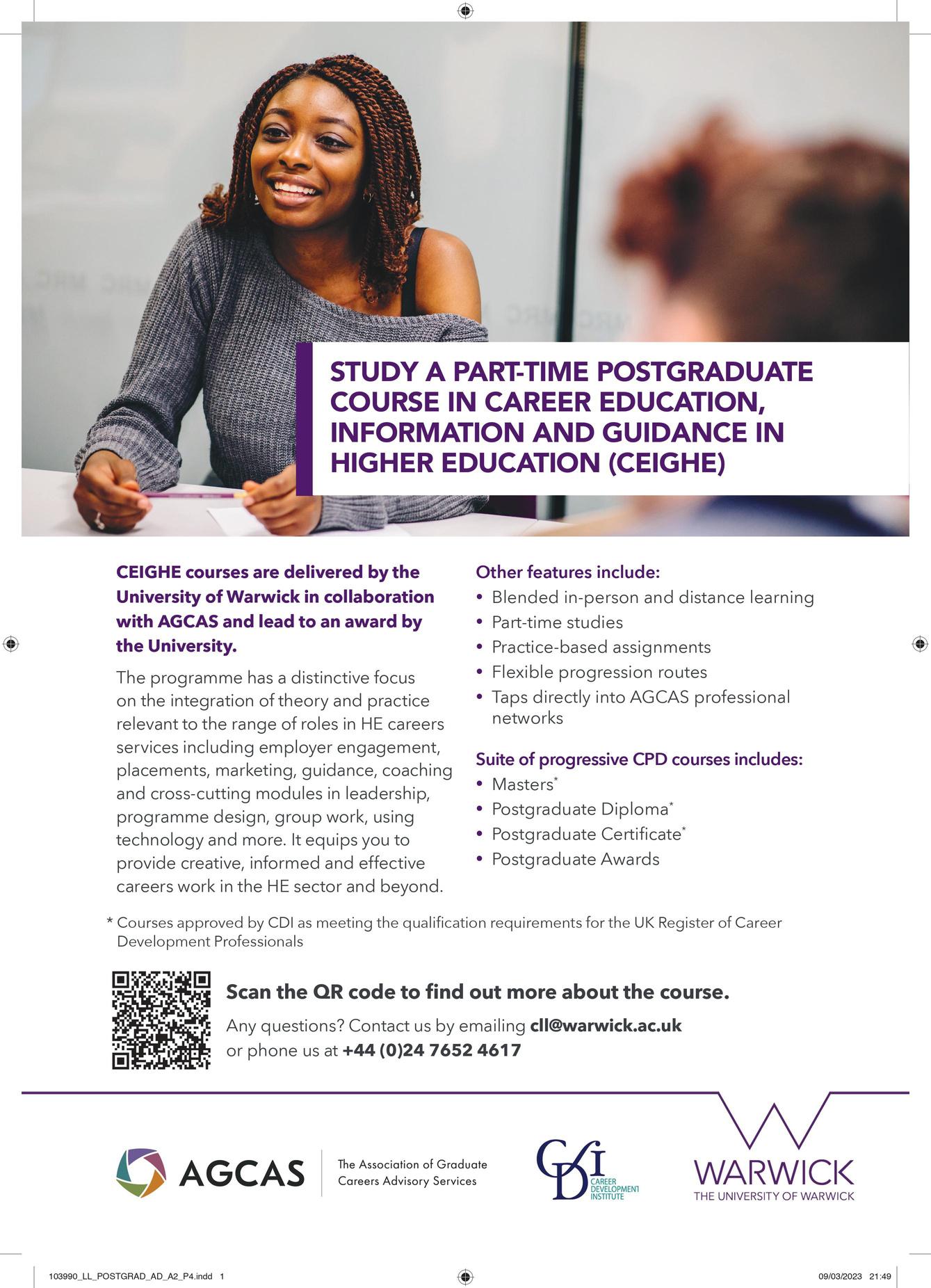
CLAIRE AYDOGAN, Head of Careers and Employability and JULIE BHAGAT, Careers
Consultant examine the increase in international student numbers and the creative solutions required from careers services to respond
At the University of Huddersfield, we have seen a dramatic increase in international PGT students applying to and choosing our university Applications have risen by 38% in the last year alone As a university, we see this increase as positive as we know international students support us financially, bring cultural diversity and are essential for the survival of the HE sector However, not only have we seen a shift in increased applications, but we have seen a change in the markets students arrive from
This brings with it new challenges, not least of which is the rise in the number of international students arriving with families and experiencing difficulties in securing accommodation These students are also struggling with financial challenges, with the cost of living and expenses being higher than imagined For careers services there are different needs, supporting students who quite rightly expect return on their investment starting their career in the UK
There are also understandable frustrations from some international students who have told us they have faced barriers to employmentunable to get through application processes, be seen for interview or be offered roles even though they are highly employable and have significant professional work experience from their home country


Firstly, our relationship with the International Office (who recruit and administer international students) has become paramount. It sounds obvious, but one of the successes is regular meetings to keep communication channels open. We now have a seat at committees and student experience groups where previously we did not We share data and ensure this is transferred back into the careers and employability service and wider networks This has led to a joinedup approach to communicating with international PGTs and we can see an increase in engagement of PGT international students accessing the service
We have a specialist Lead International Consultant based in the careers service who challenges the way in which we support international students and campaigns for positive action with employers We have provided prospective students with a better understanding of recruitment processes and a deeper awareness of the UK labour market This has been possible because our dedicated consultant has participated in briefings with prospective students, sometimes with over 1000 participants in attendance She also empowers students and graduates to research the labour market before they leave for the UK to be more prepared
We hold ourselves to account through membership of the International Student Experience Group, which focuses on international student employability, integration, intercultural development, mobility and events We set ourselves ambitious targets and check-in monthly against these, ensuring we are working effectively with academic schools and the International Office to achieve the results As a result of this group, we have improved resources specifically for international students, created content for pre-arrival within our Ready, Steady, Study scheme, developed internal paid vacancies reserved for international PGTs and created a series of podcasts featuring PGTs to raise aspirations amongst their peers
International students are essential for the survival of the
We have now launched a ‘Lend a Hand’ scheme across the university, where internal opportunities for work experience are advertised to students In return, the manager helps the student understand the skills gained in their micro work experience and produces a LinkedIn testimonial on the quality of the work This has received outstanding feedback from students and led to creating stronger CV examples Using our strong local partnerships, we launched the Green Volunteering project where international students can get involved in local green initiatives with our canals and riverside agencies Numbers are steadily increasing on this programme
We recently hosted an employer training session aimed at dispelling myths around the Skilled Worker and Graduate route visas and raising awareness around the benefits of recruiting international graduates This demonstrated the solution to the skills shortage in the UK and highlighted the urgency to recruit international students HEPI recently reported that only 3% of employers knowingly recruited using the Graduate route (January 2023)
Our event supported the recent work of AGCAS in the International Graduates Routes: Narratives from the UK job market report. We heard the voice and experiences of PGT graduates, were supported by visa experts and had up to 12 of our Kirklees 100 top employers present. We had employers who frequently recruit international students demonstrating the process they follow to recruit high calibre talent.
We are fortunate to have direct access into all undergraduate courses at the University of Huddersfield through the Global Professional Award and we use every opportunity to help home students integrate with international students We specifically designed interactive activities around the diverse body of our students to help our international students have a sense of belonging and home students to acknowledge, and better understand, the challenges international students experience
We have designed a range of postgraduate resources, specifically around decision making, that enables self-access to tools and resources Launched in March 2023, these include theoretical models and self-evaluation resources

Here at the University of Huddersfield we are energised by our international students and value the opportunity this brings us to be better global citizens and enrich our global knowledge
So can we cope with more international students? Absolutely!
C.Aydogan@hud.ac.uk
j.bhagat@hud.ac.uk

REBECCA CLIFF, Employer Engagement Marketing Executive, Nottingham Trent University (NTU), outlines why NTU are leading in the field of employability support for postgraduate taught (PGT) students, optimising internal and external collaboration and offering defined support for their students, colleagues and employers. With over 6,500 PGT students at NTU, they aim to maximise their success both in the UK and the global marketplace.
NTU are one of the few universities to offer sandwich placements as part of our PGT courses, attracting increased international applications Approximately 62% of the current PGT cohort are from overseas, the top countries NTU PGT students were recruited from in September 2022 were India (40%) and Nigeria (17%)
For those overseas, support begins before they set foot in the UK, with an employability pre-arrival module as part of the enrolment process For the two largest Schools with sandwich placements, we have a dedicated team of Postgraduate Placement Coordinators (PGPCs)

PGPCs bring commercial recruitment experience, delivering a bespoke programme that emphasises practical guidance around the realities of the UK job market, including cultural awareness They also coach PGT cohorts through recruitment processes to support their chances of securing a placement, as well as engaging with employers to understand where these students’ skillsets are most needed
We support students further with targeted communications, access to online tools and resources, and encourage participation in wider employability initiatives such as employer-led programmes and internship opportunities We currently support over 250 PGT students on placement, with routine checks by the team in accordance with UKVI guidance 96% of the postgraduate students who commenced sandwich placements in September 2022 are international
We are one of the UK’s most employment-focused universities, with graduate outcomes at the forefront of strategic decisions. We know that opening placement and work-like experience opportunities to all students will give them the platform to make informed future career decisions.
Regular internal training equips our team to champion the value that PGT students can bring to a business, helping to dispel myths including placement durations and visa routes A common challenge is that international PGT students are not eligible for 13month placements due to course limitations, so we work with employers to design placements with a 12-month duration to expand their talent pool
Our employer engagement communications emphasise the benefits of hiring international postgraduate students By encouraging employers to be more inclusive and consider PGT students, the team are creating more opportunities and developing sustainable talent pipelines for the future
Other departments also work to strengthen the breadth of support for PGT students NTU Global Lounge offer PG Welcome Workshops, designed to improve international student integration to NTU and the UK, articulating shared experiences and creating a sense of belonging
This followed research revealing international PGT January starters report lower satisfaction and engagement rates compared with other cohorts Evaluation from these programmes reinforced the positive impact of informed interventions: 90% felt the session was extremely or very useful in making them feel more connected to and supported by NTU and 90% felt the session was extremely or very useful in making them feel more confident and excited about life at NTU These responses were given by 171 of 190 attendees
As for in-curriculum integration, employability colleagues join Course Committee meetings with student ambassadors to ensure consideration for the PGT community voice. Plus, workshops undergo academic review and collaboration to ensure relevance to course modules and suitable employment opportunities. We’ve also teamed up with immigration law specialist Paragon Law, who provide an employer toolkit, 15-minute free consultation on visa routes and host an annual Graduate Immigration Route presentation to students, staff, and external stakeholders. Education of this nature is paramount when only 3% of UK employers are using the Graduate Route Visa.
Frequent employer and international alumni presentations allow students to hear their career journeys and offer first-hand advice We collaborate with colleagues from other institutions to maximise current and new partnerships, and ensure students have access to high-quality placement and graduate opportunities.
As a result, NTU and the University of Nottingham were named #InternationalAtWork Champions 2022 by Student Circus. "[They] have always gone above and beyond to support international students through consistent efforts. They've been hands-on in bridging the information gap when it comes to immigration and employment challenges facing internationals.”
To summarise:
•360° support (students, employers, colleagues) is necessary to ensure all stakeholders are committed to the collective goal
•Shared expertise is key in enabling all NTU representatives (and beyond) to champion the PGT student offer
•Informed interventions are vital to continue strengthening a cohesive and comprehensive support package
•Agility must underpin everything to meet the demands of the evolving landscape
Combining these components, we believe we can achieve our ambition to enhance the graduate outcomes of PGT students at NTU
To learn more, start the conversation with our Postgraduate Placement Coordinators, Jess Jones and Poonam Sharma
jones@ntu ac uk
sharma@ntu ac uk
We are working with employers to develop sustainable talent pipelines for the future
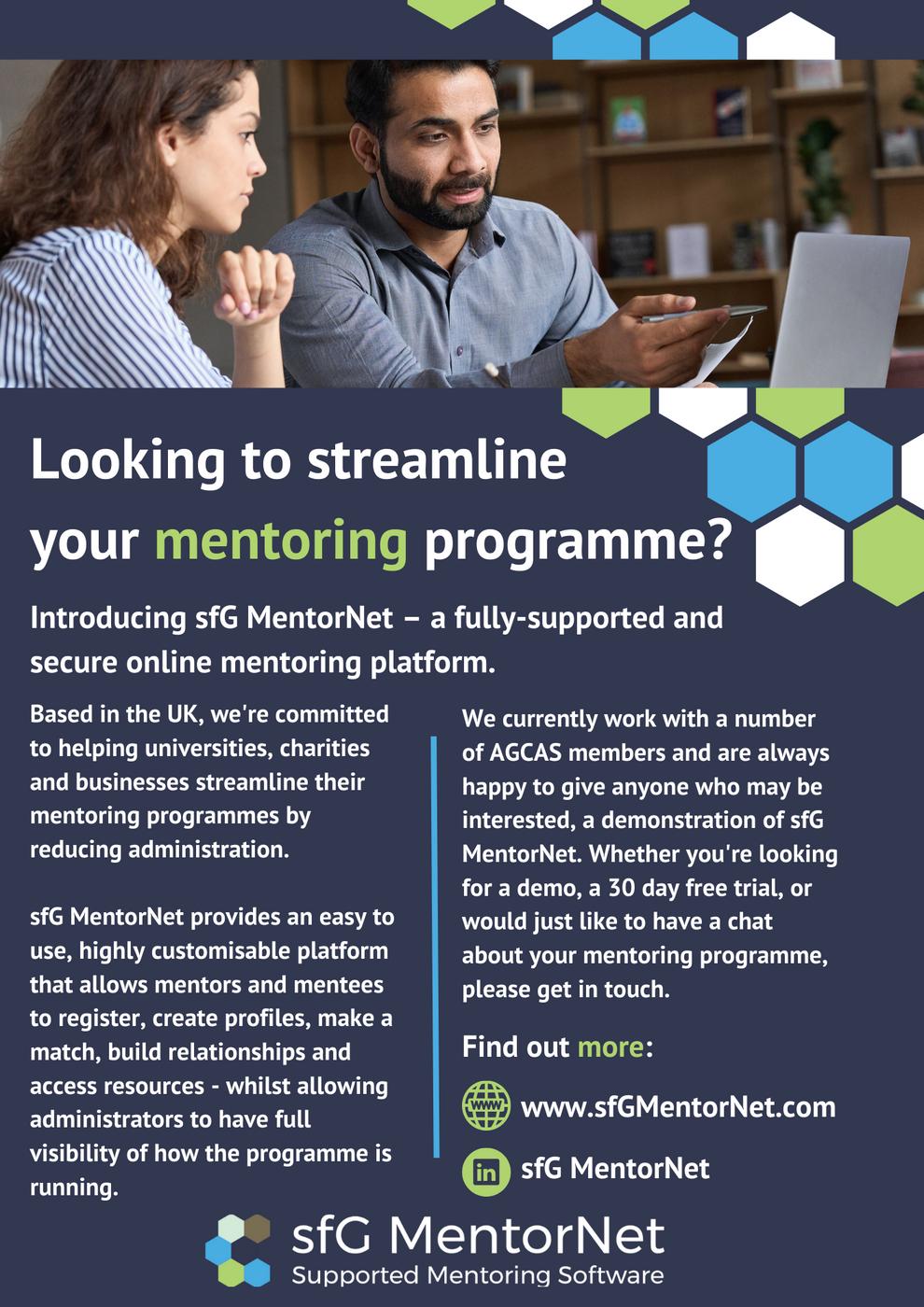
“I genuinely believe that we could not run our Professional Mentoring Programme without sfG MentorNet.”
ELLIE GALVIN, Mentoring Programme Officer from Birmingham City University, shares the purpose of the BCU Professional Mentoring Programme and how online mentoring platform, sfG MentorNet, has made life much simpler.

The purpose of the BCU Professional Mentoring Programme is to match students and graduates with a professional mentor in the sector they would like to work in By participating in the programme, mentees are given the opportunity to learn from an experienced professional, network within their chosen sector and build their confidence Mentors and mentees are also invited to join private LinkedIn groups and are asked to submit nominations for the Professional Mentoring Awards which we celebrate every September
We work with a pipeline of over 100 mentors from a wide range of sectors to match students from all year groups and we have supported 500+ matches during this programme. We run 4 10week programmes a year, with a minimum commitment of 5 hours contact time across the duration of the programme. With no mandated schedules, administration or topics of conversation, the Professional Mentoring Programme allows mentees and mentors to work flexibly around their schedules to make the programme work for them
Mentees who take part in the programme gain valuable experiences to boost their CV, a chance to improve their employability skills and increase their chances of securing a graduate job when they finish their degree Mentors who take part in the programme can grow their professional network, access support and resources from the University and get the chance to boost their own professional development
sfG MentorNet is crucial in delivering our programme It is hugely important for the programme that we have consistent, corresponding registration forms, as well as a location where we can store student information and external employer information with equal levels of ease
The matching process for each programme would be considerably more difficult without the use of this platform. sfG MentorNet also gives our mentees and mentors total autonomy over their profiles, meaning they can edit preferences, mentee capacity and programme availability, without having to go through a BCU staff member This also supports my workload as the Mentoring Programme Officer
It allows us to efficiently record mentor and mentee information and store it securely Although we match our participants of the programme by hand, sfG MentorNet’s matching function is a fantastic way to secure and confirm the success of a match Once matched, participants have access to sfG MentorNet Chats, which is invaluable when safeguarding our mentees and mentors during early-stage interactions and allows those on the programme to have total control over sharing their personal details These chats can also be monitored which is incredibly useful
We run several different Professional Mentoring streams and sfG MentorNet allows you to have separate programme setup that are fully ringfenced, protecting the data of our mentees and mentors furthermore and ensuring that everyone is appropriately assigned to the correct mentor


sfG MentorNet is also a useful resource hub We have a number of important resources that mentors and mentees need to access through the programme, including training videos, awards nominations and how to set up the sfG MentorNet app on your phone By having these stored on the platform and easily accessible, all participants have access to the resources required to get the most out of the programme
I genuinely believe that we could not run our Professional Mentoring Programme without sfG MentorNet From being able to easily register students and external parties on the same, userfriendly platform, to being able to safeguard participants from the start of the programme through until its closure, sfG MentorNet acts as an incredibly useful directory, communication platform and resource hub

At sfG MentorNet, we are proud to provide our customers with our secure, online mentoring system – in the knowledge that by using our platform, individuals all over the world have access to educational relationships and guidance, through a safe and secure, user-friendly platform
ANDREA TODD, Director of Pro Bono and Community Engagement at the University of Chester, and LUCY BLACKBURN, Director of the Advice and Resolution Centre at the University of Central Lancashire, are co-Chairs of the Clinical Legal Education Organisation In this article they provide a taste of their QWE Toolkits for students and careers advisers by explaining the reality behind eight common QWE misconceptions
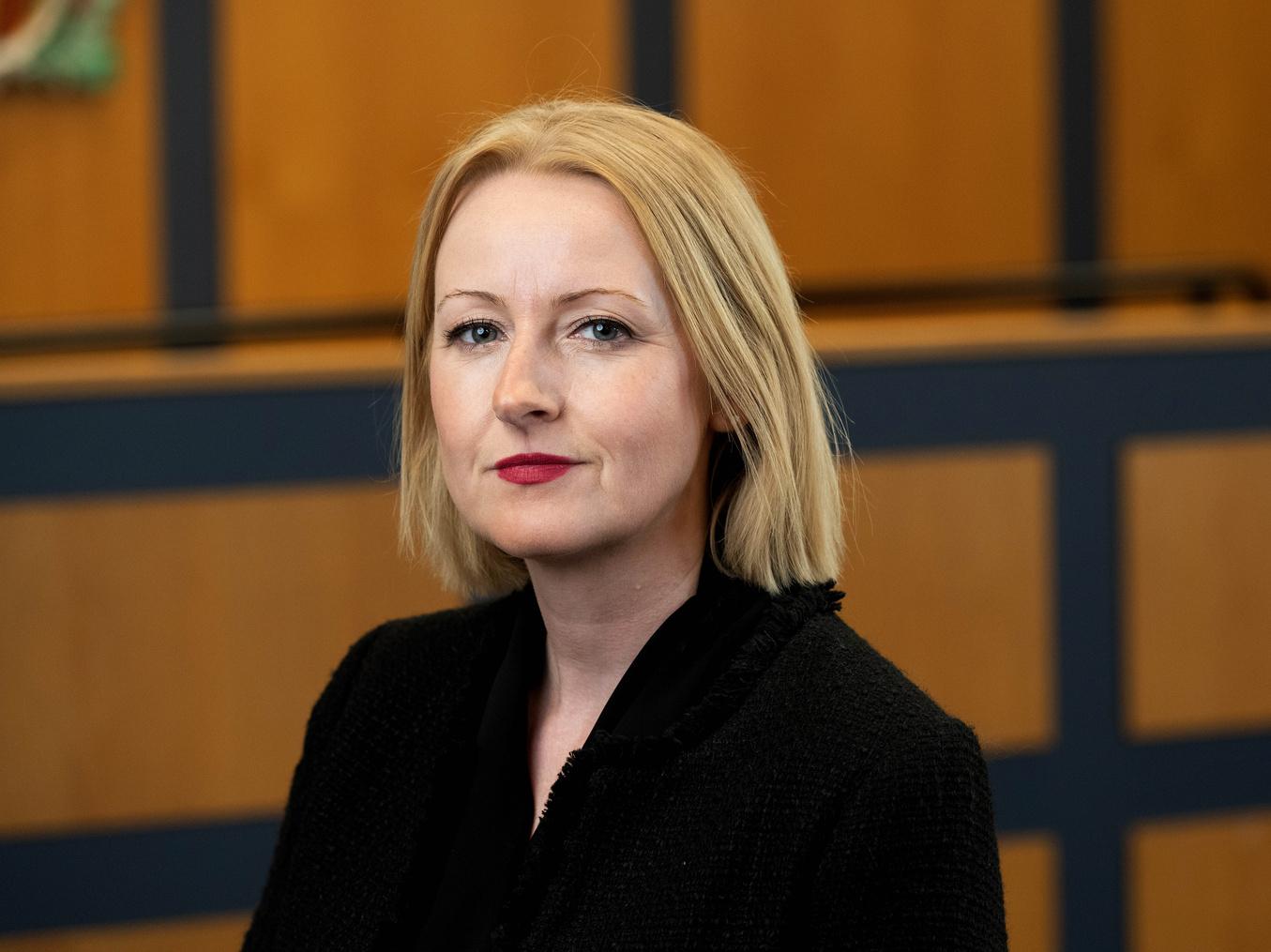
The route to qualifying as a solicitor changed fundamentally in September 2021 with the introduction of the Solicitors' Qualifying Examination (SQE) and its accompanying provision for Qualifying Work Experience (QWE).


QWE will be at the forefront of postgraduate students' minds, notably those undertaking the Legal Practice Course (for as long as providers continue to offer this) and those who are studying for the SQE1 and SQE2 assessments either as stand-alone preparation courses or incorporated into postgraduate masters programmes. QWE has the potential to greatly enhance access to the legal profession, but it is important that students are properly informed about QWE to enable them to capitalize on the opportunities it presents.
Five weeks of work experience in a law firm will not necessarily equate to five weeks of QWE For work to count as QWE, the student must:
1. Be providing 'legal services' as defined by the Legal Services Act 2007; and
2. When providing these services, have the opportunity to develop two or more of the competences in the Solicitor’s Regulation Authority’s Solicitor (SRA) Statement of Competence; and
3. Have the work signed off by a solicitor qualified in England & Wales.
Not all work carried out during work experience will necessarily be counted as 'legal services'. For example, time spent assisting with purely administrative tasks with no direct client benefit, working on business development and undertaking mocked up tasks designed to keep the student busy cannot be seen as providing legal services
'I can only start my period of QWE when I’ve finished my SQE' Students can undertake QWE before taking either or both of the SQE1 legal knowledge tests and SQE2 competency-based assessments There is also the option for students who have completed the Legal Practice Course to undertake the SQE2 assessment and two years of QWE instead of undertaking a training contract
'I
QWE can be claimed retrospectively, including for experience gained prior to the introduction of the SQE route in September 2021 The new regime will, in this way, be of significant benefit to students who have previous work experience to draw upon
'I can't claim QWE for work done outside of England & Wales'
Only solicitors qualified in England and Wales can confirm QWE, but it is not necessary for QWE to be undertaken in England and Wales This means that work experience gained anywhere in the world can count, provided that there is an England and Walesqualified solicitor available within that setting to confirm the period of QWE
'QWE
Unlike the traditional training contract during which trainees undertook two years of recognised training within one law firm, QWE can be gained in up to four different organisations, and these do not necessarily need to be law firms QWE can be undertaken in organisations such as university law clinics, law centres, and work within any other organisation which has an England & Walesqualified solicitor able to confirm the period of QWE
'QWE tests whether I'll make a good solicitor'
The SRA guidance on QWE states that confirming QWE ‘does not involve deciding whether an individual is competent and suitable to practise’. If the requirements for QWE have been met, then even if the student has not performed competently, the period must be confirmed as QWE. It is for SQE2’s series of oral and written assessments to test the candidates’ practical client-facing skills and competency as a ‘day one ’-ready solicitor
The two years of QWE need only be registered with the SRA by the time the candidate applies to be admitted as a solicitor Whilst it is possible to apply to register a period of QWE as soon as it has been completed, students should be advised not to do this until they have collected at least four periods of QWE As it may not be possible to revoke a period of QWE once it is registered, a student may regret the immediate registration of a relatively short period of QWE if they are later presented with the opportunity to gain a longer period of QWE with another organisation which could have been used instead
Students are best advised to ask the QWE provider to confirm the QWE internally (see our Toolkits for further information on the details of this process) but to delay applying to the SRA to register it until later, when they are in a better position to make an informed decision about its value relative to other periods of QWE accrued.
'Having QWE guarantees a shorter period of training with my chosen firm'
Despite an incoming candidate having accrued even a significant period of QWE, some law firms may still require them to undertake a two-year period of training with their firm so that they feel the individual is sufficiently trained in the ways of the firm before they will offer them a permanent role as a solicitor This is the firm’s decision and the SRA will not intervene in this
For a more in-depth guide to QWE and its interaction with work experience, including a process chart for claiming and registering QWE gained via work experience, placement and/or internships, please contact andrea todd@chester ac uk to request the authors’ Student Toolkit on QWE and Work Experience, and Advising Students on QWE: The Careers Adviser’s Companion, produced for use by AGCAS members

'I need to record my QWE with the SRA as soon as I finish my placement'Connect with Andrea on LinkedIn
DR JULIA YATES, Associate Professor in Organisational Psychology at City, University of London, shares her latest digest of careers-related research


Rude, D E , Sebastijanovic, M , Belinne, J K , & Hopkins, T D (2022) The Career Project: An Intervention to Facilitate Career Development. Southwestern Business Administration Journal, 20(1), 6.
READ RESEARCH
It is always good to get some clear evidence for the value of career interventions, but this one is a particularly interesting in that the intervention itself was conducted with minimal input from career practitioners, relying almost entirely on self-directed learning from the students The paper reports the findings of an evaluation into a self-directed careers education programme within a management course at Houston University, Texas The students were given just 30 minutes of instructor input, during which they were briefed on the assignment, and they then worked through the different aspects of the programme on their own. The programme comprised 8 elements: a CV assessment, identifying career goals, backup plans, personal strengths, organizational research, an informational interview, and a market assessment. The authors compared students’ survey results before and after the module and compared them with a control group. They found that the project has a significant impact on career planning and job search goals, and appeared to have a positive impact on employment and salaries at graduation.
Quinlan, K M , & Corbin, J (2023) How and why do students’ career interests change during higher education? Studies in Higher Education, 1-13.
We know that students who opt for vocational courses don’t always want to pursue a job in that field We also know that this can be challenging as they re-conceptualise their own identity and may not get the support they need from within their department This paper explores these changes in vocational students’ career interests during their time at university The study looked at final year students on both academic and vocational courses and found that 61% reported that their career interests had changed since they started their courses The specific nature of the changes varied, with some students becoming more clear about their career choices and others less clear Some reported radically different areas of interest but most shifted their thinking a little – staying within the same broad industry classification, but changing the specific role they were drawn to The students were also asked to identify what had influenced these changes, and nearly half said that it was the curriculum itself that had led to the change, with smaller numbers describing the influence of work experience, networking and extracurricular activities Most interesting perhaps, was the finding that there were no differences between students on academic and vocational courses – suggesting perhaps that students applying to vocational degree courses are no more firmly wedded to their future career plans than students on non-vocational programmes.
Ge, X , Gao, L , & Yu, H (2023) A New Construct in Career Research: Career Crafting. Behavioral Sciences, 13(1), 49
READ RESEARCH

The idea of job crafting has been around as a term for a few decades It refers to the way we gradually change the parameters of our job to make it suit us better – bit by bit getting rid of the aspects of the work we don’t like, and taking on more projects that we really enjoy (they call this ‘bottom-up job redesign’ in the literature) Job crafting happens very naturally, but it’s a useful concept to share with individuals and organisations, because it reaps rewards, increasing job satisfaction and lowering turnover This paper introduces an extension to this: career crafting Career crafting takes the idea of gradual step-by-step improvement but applies it to a whole career The authors suggest that career crafting can help you to develop a sustainable career that is more meaningful, better suited to your skills and more closely aligned with your non-work self The authors highlight the importance of reflecting on yourself and your career aspirations and making short- and longer-term proactive choices that can lead to a better ‘ person-career fit’. Echoing the three aspects of job crafting, the authors talk about career level task-crafting (making sure that you are working on tasks that develop the right skills), relational-crafting (developing networks with like-minded workers across organisations), and cognitivecrafting (reflecting on the meaning of your career and how it aligns with your life and life goals).
Corlett, S., Stutterheim, S. E., & Whiley, L. A. (2023). “I only wanted one thing and that was to be who I am now ” : Being a trans young adult and (re) negotiating vocational identity Gender, Work & Organization READ RESEARCH
Although trans issues have been very visible over recent years, there have as yet been very few empirical studies on the topic, so it is great to read about this research into the career development of trans young people. This paper reports the findings of ten indepth interviews with trans adolescents in the Netherlands and Belgium. One key theme that emerged was that the young people said that they struggled to think about both their vocational identity and their gender identity at the same time –they simply didn’t have the cognitive or emotional energy to deal with both, so some left thinking about careers until later than they would have liked, and others felt that they did not address their gender identity early enough. Another dispiriting although perhaps not altogether surprising finding was that the young people felt that their trans identity would reduce their chances of being accepted for any job and would actually entirely preclude certain job fields. They felt that they would not be able to work with children or teenagers – not because of any issues with the children or the jobs themselves, but because of stigmatizing attitudes held by parents They also felt that they would not be accepted in traditionally masculine fields such as construction or the police force, or fields which were very traditionally gendered such as law The Netherlands and Belgium are both quite progressive and supportive of LGTQI+ rights, and the stories in this paper make uncomfortable reading, but it is great to see that this important work is being carried out
julia.yates.1@city.ac.uk
Marketing and Operations Director, Jisc shares insights into the graduate labour market and looks ahead to the future


News that we are likely to avoid a recession this year will be encouraging for students reaching the end of their studies But while the main drivers may be easing, the main effects are already here and likely to last
As we move through 2023, our labour market experts are anticipating falling real-term wages, hardship for many and, in terms of propensity to hire, a lot of uncertainty Business confidence is faltering and so investment in training and hiring could fall
At this point in the recruitment cycle, we’d already be seeing cuts in hiring and possibly layoffs That’s not happening much in the graduate labour market This is because of the persistent shortages In sectors that employ a lot of graduates such as IT, professional services, tech, engineering, health, social care and related industries, we haven’t had enough candidates to meet demand for some time, and many businesses are running at sub-optimal staffing levels For this year ’ s graduates it means that, even if the economy falls into a recession, we doubt there will be substantial drops in recruitment
Given the negative headlines of late, even if graduate recruitment stays strong, perception could be that jobs are scarce It is important that we help students understand the reality of the market, to support and boost their confidence
We anticipate that low motivation and confidence are likely to continue to have an impact on job applications through 2023 We all need to remember that during economic downturn, graduates always fare better than those without a degree
Employers have reduced their reliance on grades to assess whether a graduate is suitable for a role. The Institute of Student Employers reported that less than half of graduate employers stipulated a 2:1 degree for the first time last year. Santander became the latest to announce that they are no longer specifying a 2:1 degree. They will not be the last this year.
Skills developed through work experience and other career development opportunities are vital Careers services play an important role in helping students identify what they have done and translating that into why they would make a great employee
To understand how economic, political and other forces are affecting career views and choices we are in the process of surveying thousands of students and graduates Our findings will launch in the Prospects Early Careers report later in the spring You can read the current report on Prospects Luminate
If you need the latest graduate destination data, What do graduates do? is now available online This essential deep dive into the outcomes of students who left university during the pandemic includes subject-by-subject data Expert analysis by careers and employment professionals provide the vital context
Careers professionals wanting to use this data alongside their students will find it in a student-facing context on Prospects in What can I do with my degree? We have also launched Prospects Link, a new service that enables students registering for Prospects services to be automatically linked with their university careers service If you would like to find out more about Prospects Link, please email Ellie Reynolds
Part of the valuable relationship we have with AGCAS is sharing our understanding of student challenges and needs in relation to career planning so that we can improve the support and resources available
Last year, we surveyed our careers service colleagues to ask about their priorities and challenges. I’m sure you won't be surprised to hear that student engagement was by far the biggest issue for careers departments.
During March we ran a series of roundtables to discuss this issue in more depth and explore what short and longer term solutions Jisc, with the help of careers services, could bring to the table. We will share our findings in the next issue of Phoenix. We hope that it will help you to improve student engagement and inform how Jisc services could help.



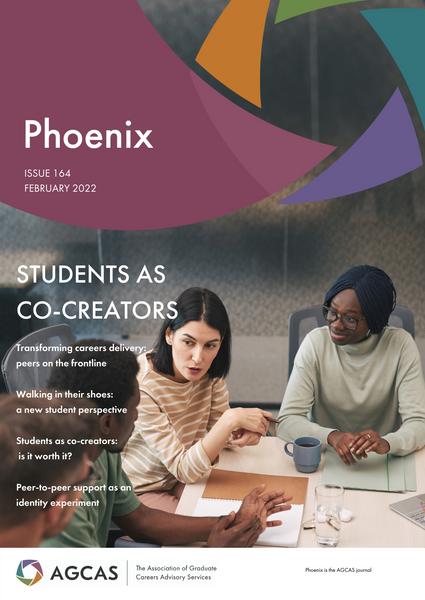
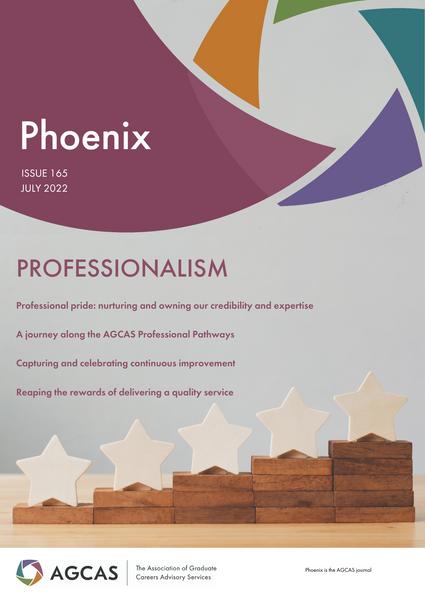
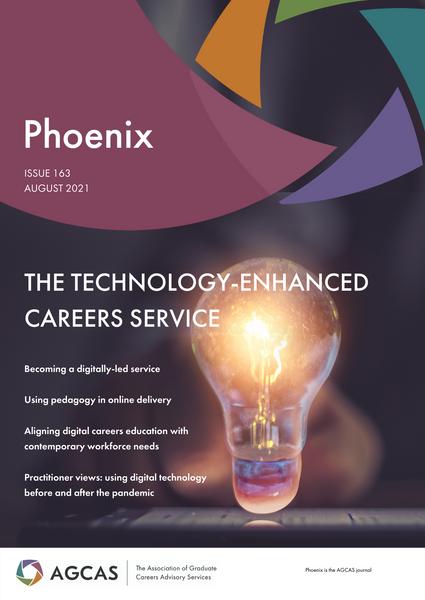
JULY 2023
THIS ISSUE INCLUDES CONTRIBUTIONS FROM AGCAS MEMBERS AT THE FOLLOWING SERVICES:
Aston University
BPP University
Cardiff University
Imperial College London
King's College London
Lancaster University
Nottingham Trent University
The University of Edinburgh
University of Bath
University of Birmingham
University of Hertfordshire
University of Huddersfield
University of Leeds
University of Nottingham
University of Warwick